Time & Task Manager For WHMCS
Contents |
About Time & Task Manager For WHMCS
| Time & Task Manager For WHMCS will let you add various tasks, track their development basing on the time spent on their execution and charge your customers accordingly. The module enables your clients to order and monitor products with a chosen number of hours that can be spent on performance of your services. |
- Addon Module Features:
| ✔ Add/Edit/Remove Support Clients |
| ✔ Add/Edit/Remove Tasks |
| ✔ Add/Edit/Remove Predefined Tasks |
| ✔ Add/Edit/Remove Time Entries - Time Spent On Task |
| ✔ Create/Edit Custom Tasks Connected To Specific Tickets |
| ✔ Create/Edit Tasks With Default Rates, Status And Urgency From Tickets |
| ✔ Define Billable Time Entries |
| ✔ View List Of Billable Time Entries |
| ✔ Generate Invoices Automatically Or Manually |
| ✔ Generate Draft Invoices Only |
| ✔ Add Invoice Creation To Cron Queue |
| ✔ Bill For Time Spent On Solving Tickets |
| ✔ Define And Bill For Mileages Traveled |
| ✔ Set Predefined Prices |
| ✔ Send Email Notifications - New Task/New Time Entry |
| ✔ Generate And View Fully Configurable Reports On Your Clients And Administrators |
| ✔ Choose The Type Of Configurable Permissions - Full Privileges And Operator Privileges |
| ✔ View Logs |
- Provisioning Module Features:
| ✔ Create Support Client Accounts Upon Module Activation |
| ✔ Add Defined Number Of Prepaid Hours And Incidents To Your Clients Automatically |
| ✔ Supports One Time & Recurring Payment Types |
- Client Area Features:
| ✔ View Lists Of Opened And Closed Tasks |
| ✔ View Current Task Status, Worked Hours And Hourly Rate |
| ✔ View Purchased Prepaid Hours |
| ✔ View Balance Of Available Or Exceeded Hours |
| ✔ Buy Additional Hours |
- Task Configuration:
| ✔ Support Client |
| ✔ Task Name |
| ✔ Predefined Incidents |
| ✔ Predefined/Custom Charge Per Hour |
| ✔ Custom Charge Per Extra Hour |
| ✔ Charge Per Mileage |
| ✔ Mileage Type - Billable / Visible For Client And Administrators / Visible For Administrators Only |
| ✔ Task Status |
| ✔ Task Urgency |
| ✔ Description |
| ✔ Time Entries |
- Available Cron Job Behavior Settings:
| ✔ Generate Invoices For Queued Time Entries Only |
| ✔ Generate Invoices For All Time Entries From Previous Week |
| ✔ Generate Invoices For All Time Entries From Previous Month |
| ✔ Generate Zero Invoices For Prepaid Entries |
| ✔ Enable Auto Credit Application On Invoice Generation |
- General Info:
| ✔ Fully Integrated With Lagom WHMCS Client Theme |
| ✔ Multi-Currency Support |
| ✔ Multi-Language Support |
| ✔ Supports PHP 8.3 Back To PHP 8.2 |
| ✔ Supports WHMCS Themes "Six" And "Twenty-One" |
| ✔ Supports WHMCS V9.X Back To WHMCS V8.10 |
| ✔ Requires ionCube Loader V14 Or Later |
| ✔ Easy Module Upgrade To Open Source Version |
Installation and Configuration
| This tutorial will show you how to successfully install and configure Time & Task Manager For WHMCS. We will guide you step by step through the whole installation and configuration process. |
Installation
| 1. Log in to our client area and download the module. |
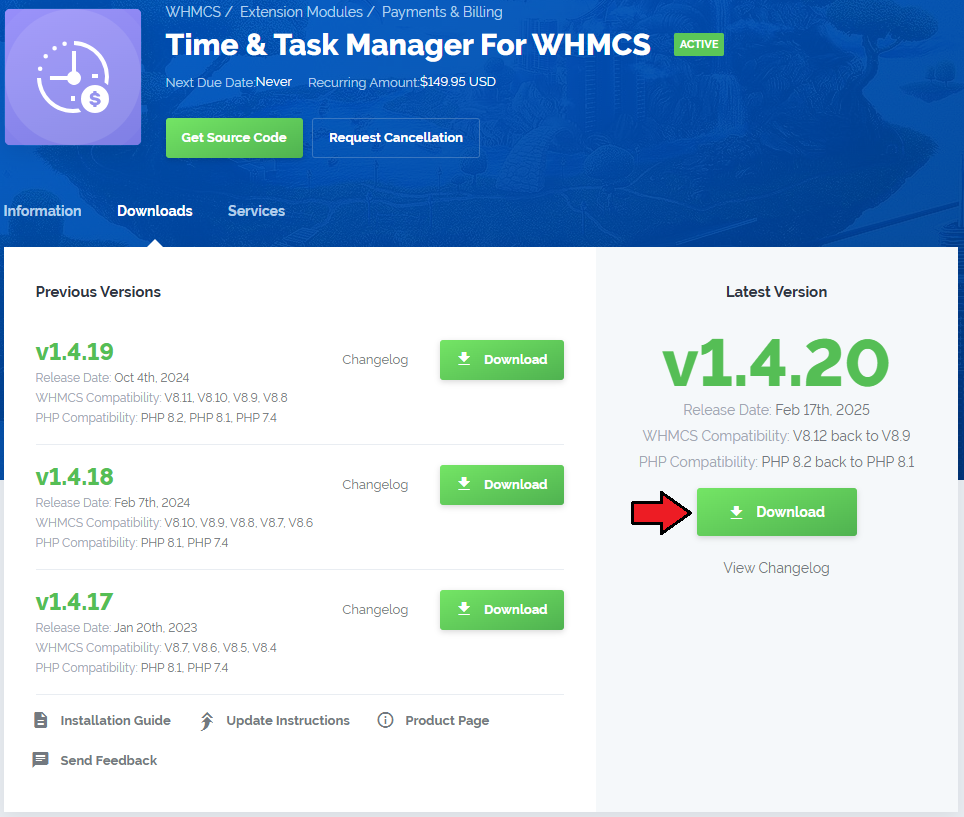
|
| 2. Extract the package and upload its content into the main WHMCS directory. The content of the package to upload should look like this. |

|
| 3. When you install Time & Task Manager For WHMCS for the first time you have to rename 'license_RENAME.php' file. The file is located in 'modules/addons/TimeTaskManager/license_RENAME.php'. Rename it from 'license_RENAME.php' to 'license.php'. |
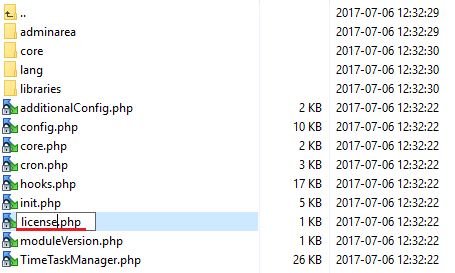
|
| 4. In order to configure your license key, you have to edit a previously renamed 'license.php' file. Enter your license key between quotation marks as presented on the following screen. You can find your license key in our client area → 'My Products'. |

|
Configuration of Addon
| 5. Now you have to activate the module in your WHMCS system. Log in to your WHMCS admin area. Go to 'Setup' → 'Addon Modules'. Afterwards, find 'Time & Task Manager' and press the 'Activate' button. |
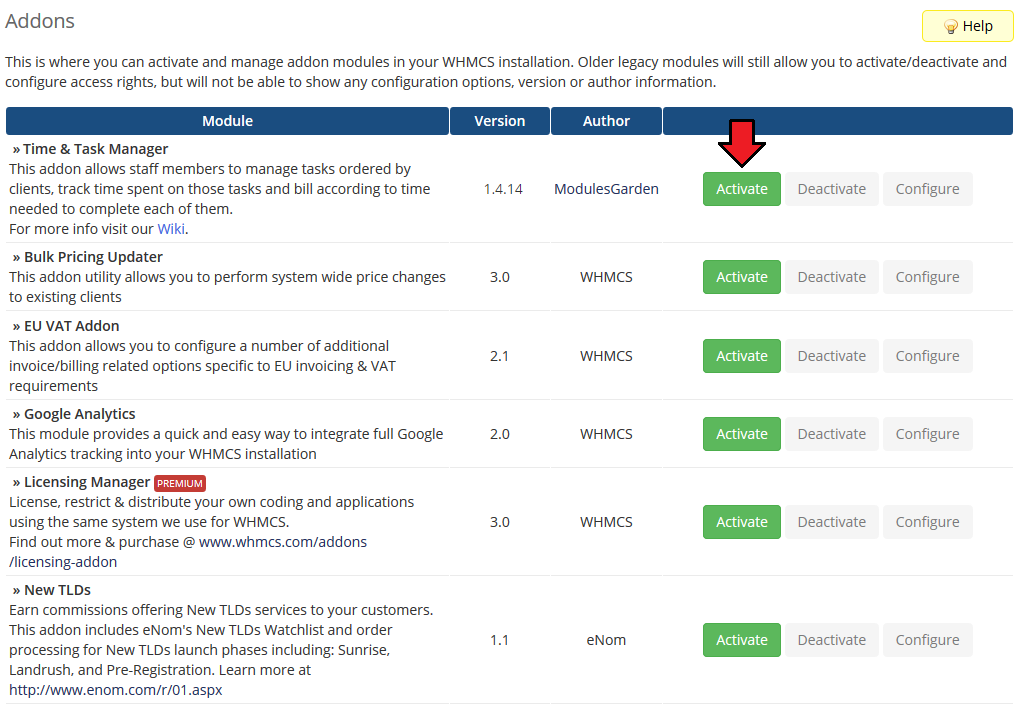
|
| 6. In the next step, you need to permit access to this module and set up basic configuration. To do so, click on 'Configure' .
If you select in the addon configuration e.g. 'System' type, then all email messages from this addon will be labeled as 'System Emails' and as such delivered to admin users belonging to a group with this email message type selected.
|
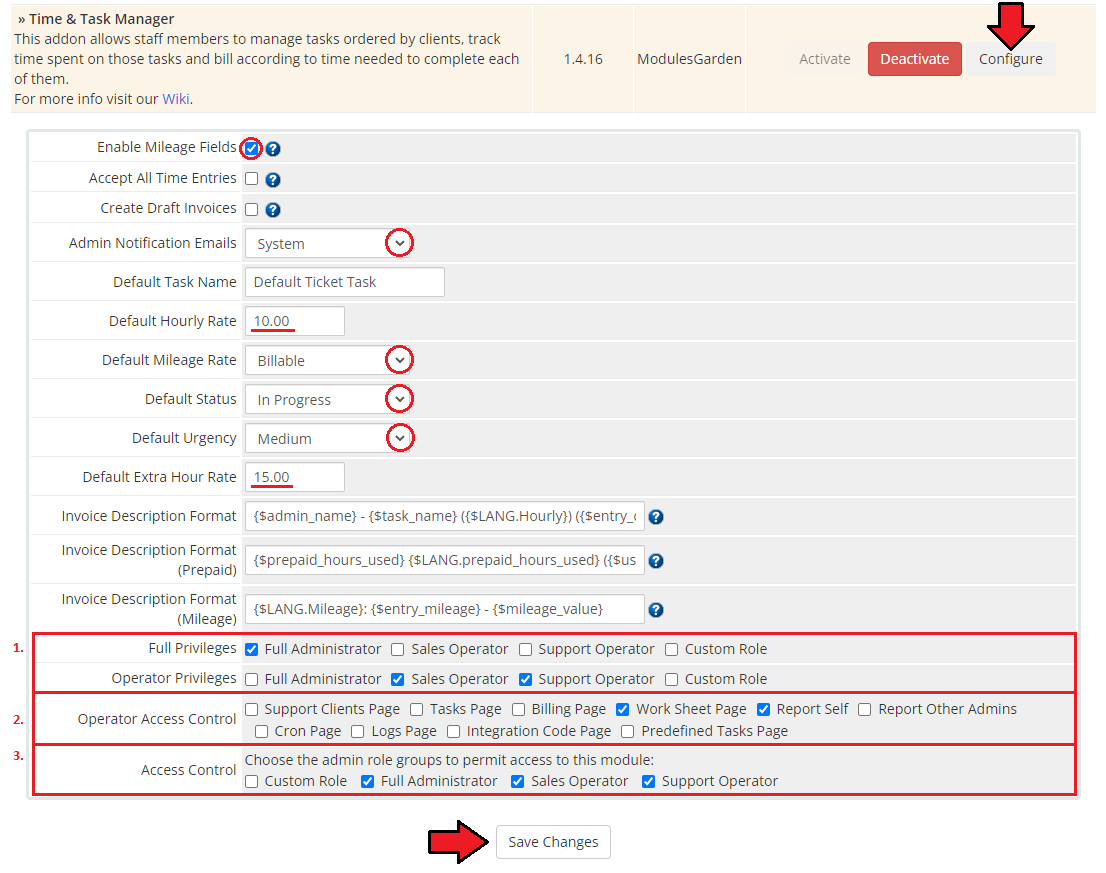
|
| 7. Additionally, here you can set up invoice description format and predefined price per hour. Accept All Time Entries - mark this option to let the module bill the additional time entries. You can use variables listed under the help sign to define invoice description, each invoice description allows a different set of variables. |
| Invoice Description Format: {$admin_name} |
| More about setting up the predefined price per hour can be found in the Predefined Price And Prepaid Hours section. |
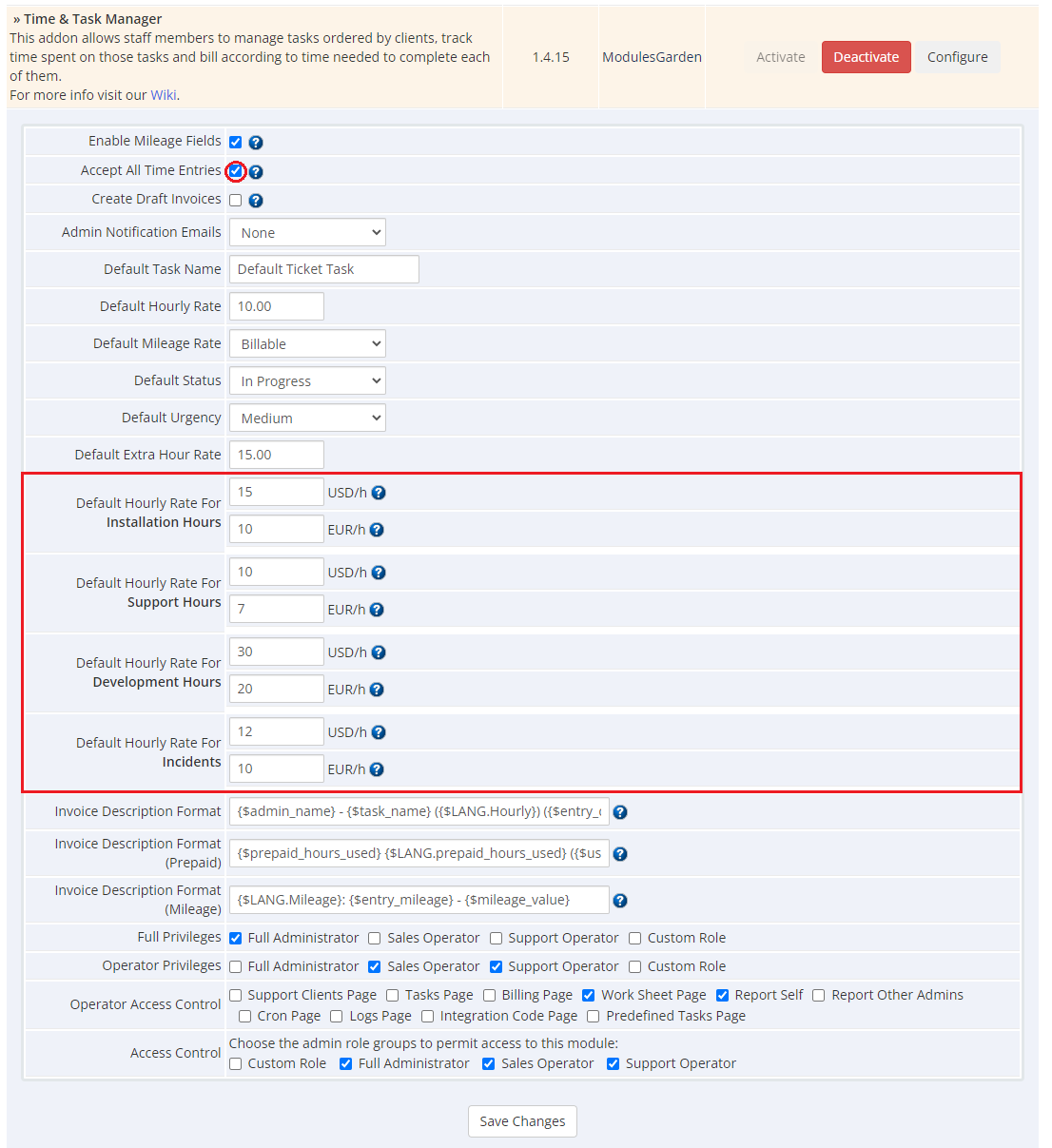
|
| 8. You have just successfully installed Time & Task Manager For WHMCS! You can access your module in 'Addons' → 'Time & Task Manager'. |
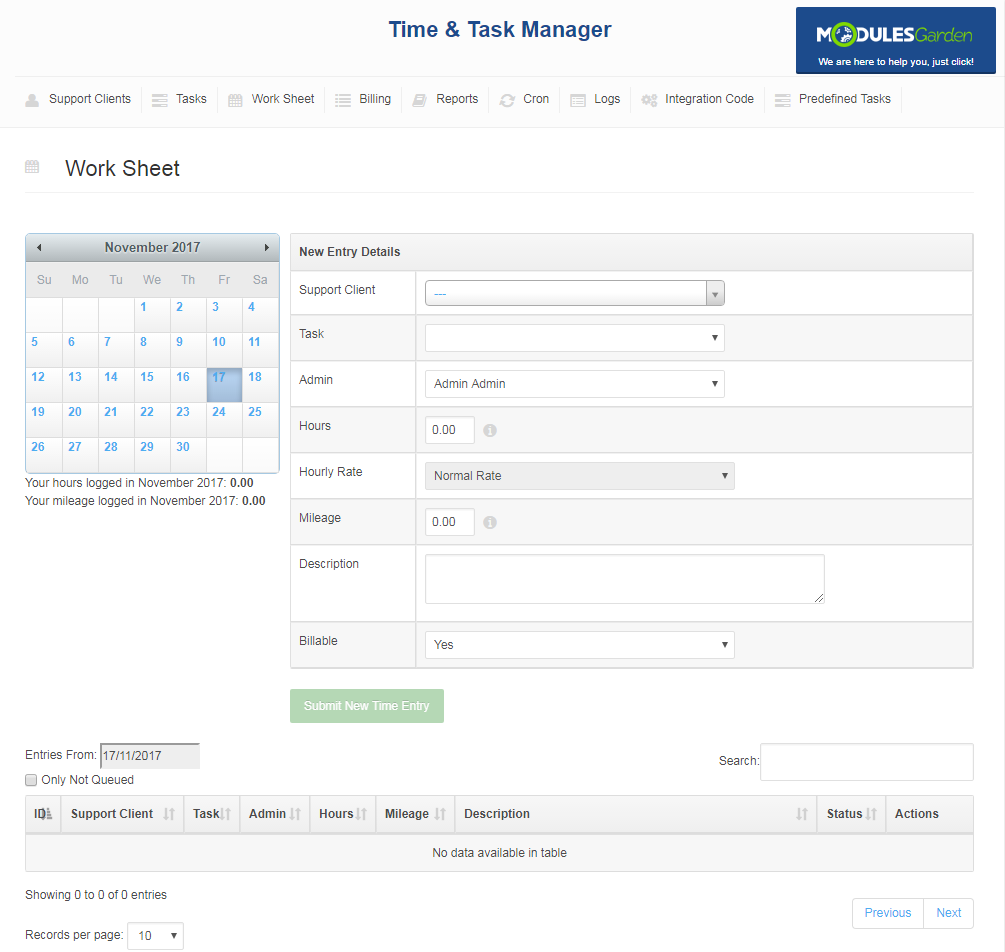
|
| Remember to clear templates_c folder when migrating to Time & Task Manager 1.3.0 version or a newer one! |
Management
| In this section, we will show you how to properly set up and use Time & Task Manager For WHMCS. Our module allows you to easily add and track the progress of the tasks ordered by your clients while your staff members are able to easily report time spent on each of them. |
Predefined Price And Prepaid Hours
| You can easily set up a predefined price per hour using Custom Client Fields. Afterwards, you can sell those hours to your clients using the provisioning module. |
Setting Up Custom Field
| First of all, set up Custom Client Fields visible only from the admin area. To do so, proceed to 'Setup' → 'Custom Client Fields'. Fill in its name, choose 'Text Box' as your 'Field Type' . ^[0-9]*$ Note: Only the following values can be used to specify a predefined price: Installation Hours, Support Hours, Development Hours, Incidents. |
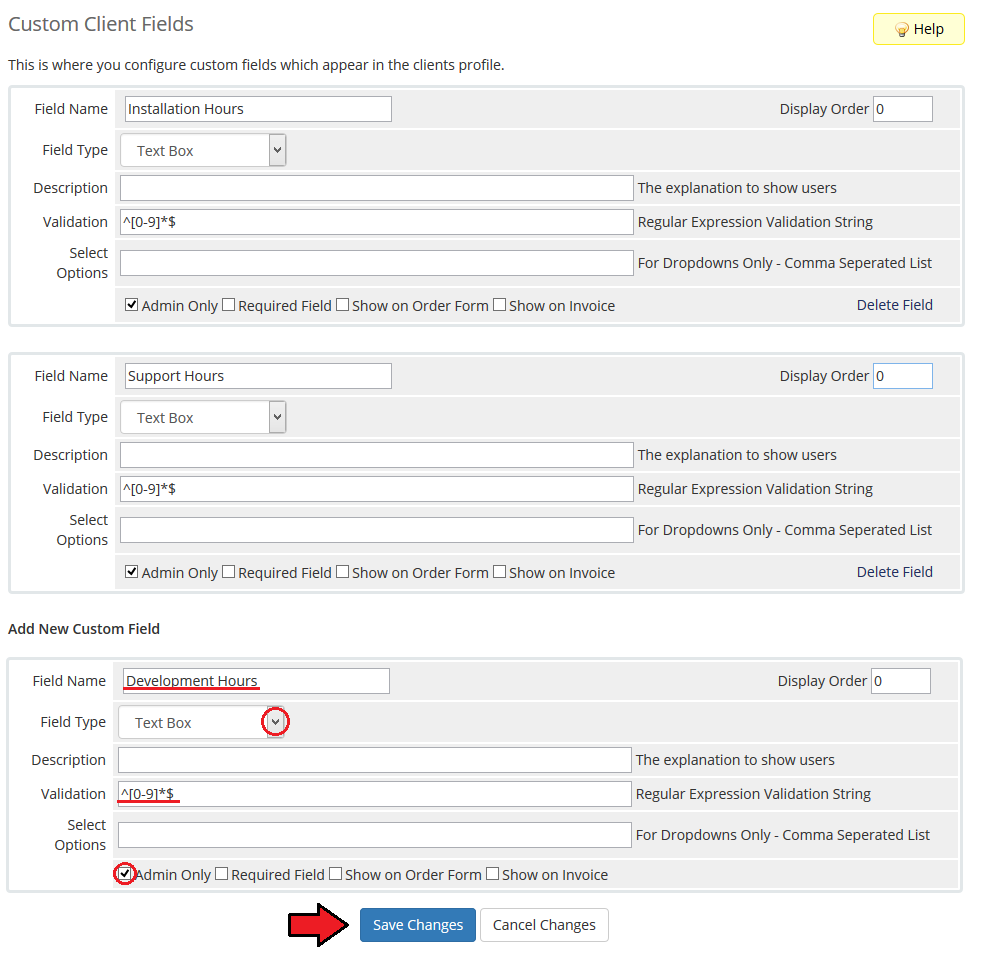
|
| You can set up prepaid incidents the same way. The only difference is placing 'incident' into the 'Select Options' field. |
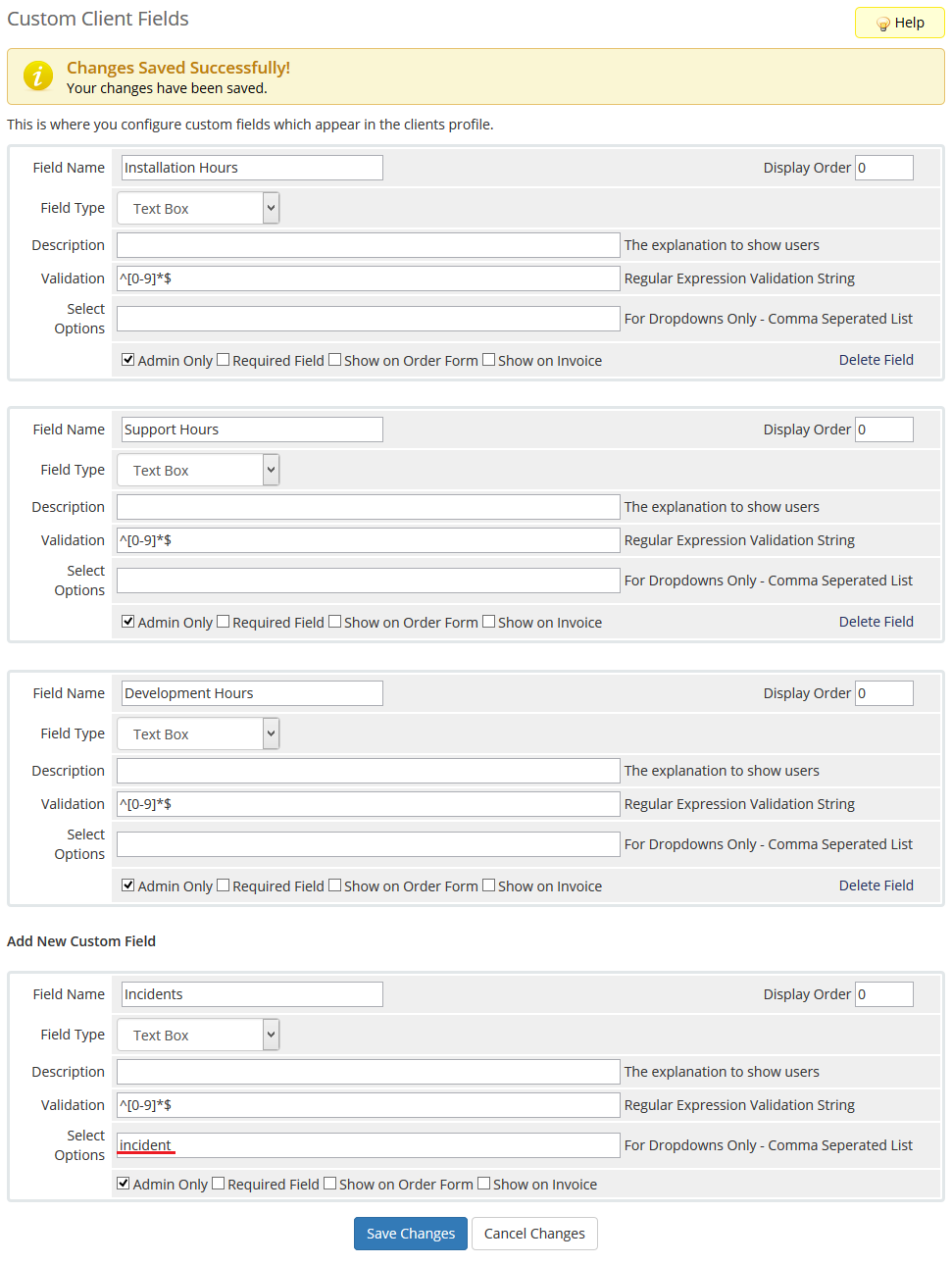
|
Predefined Price
| Once you have created a custom client field, proceed to 'Setup' → 'Addon Modules' and press 'Configure' next to 'Time & Task Manager'. Afterward, fill in a predefined price per hour for the previously created custom field and press 'Save Changes'. |
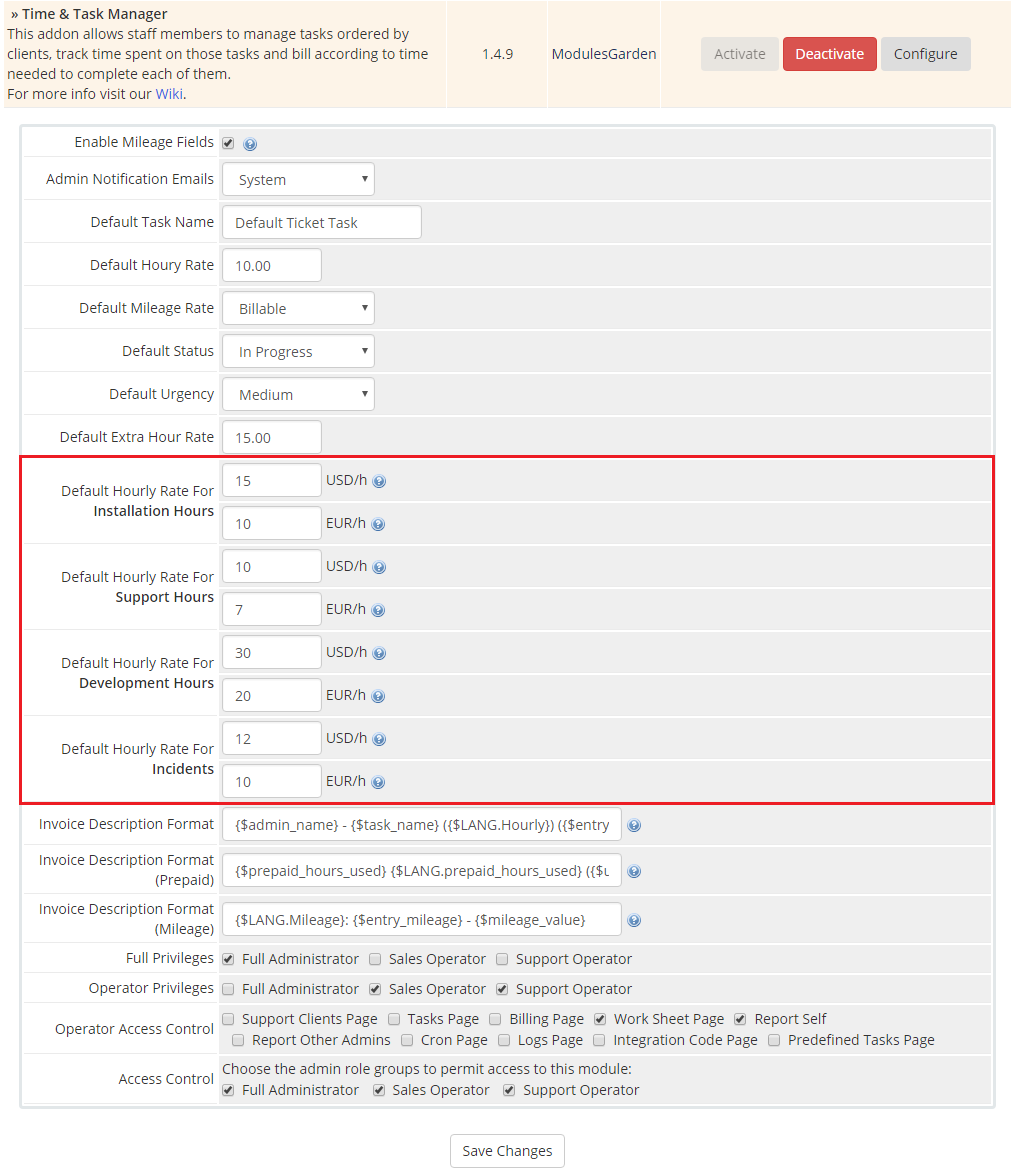
|
Prepaid Hours & Incidents
| Owing to our module, you can even offer prepaid hours and incidents to your clients as a product in your system. To set up your first product, proceed to 'Setup' → 'Products/Services' → 'Products/Services'. |
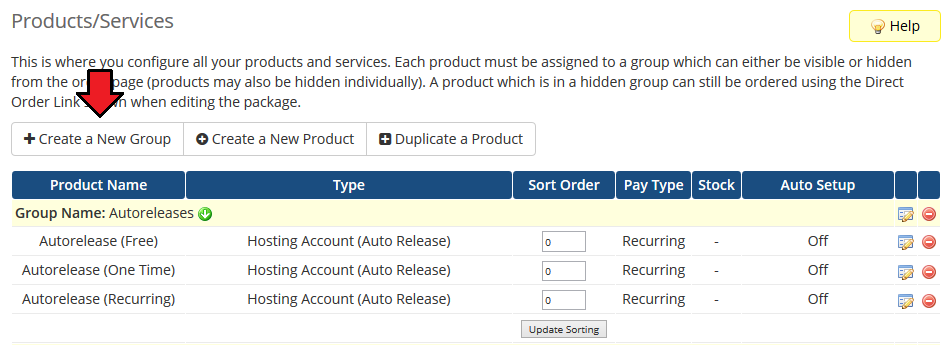
|
| Fill in a product group name and press 'Save Changes'. |
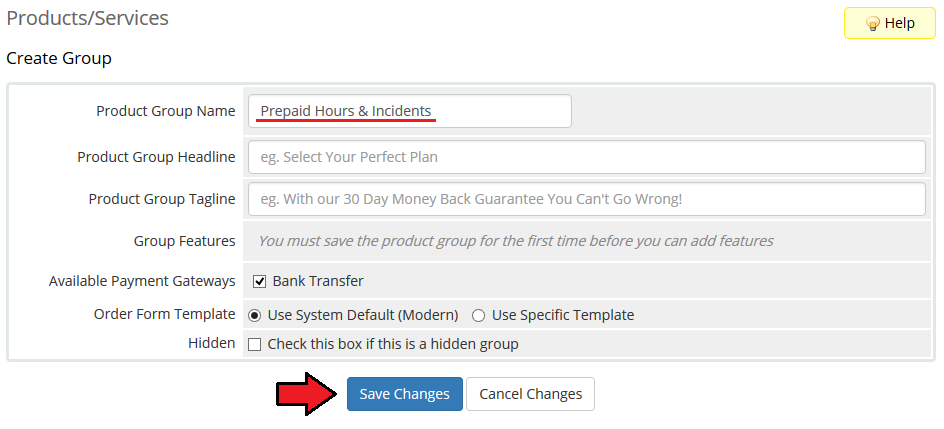
|
| Now, create a new product, press 'Create a New Product' to proceed. |
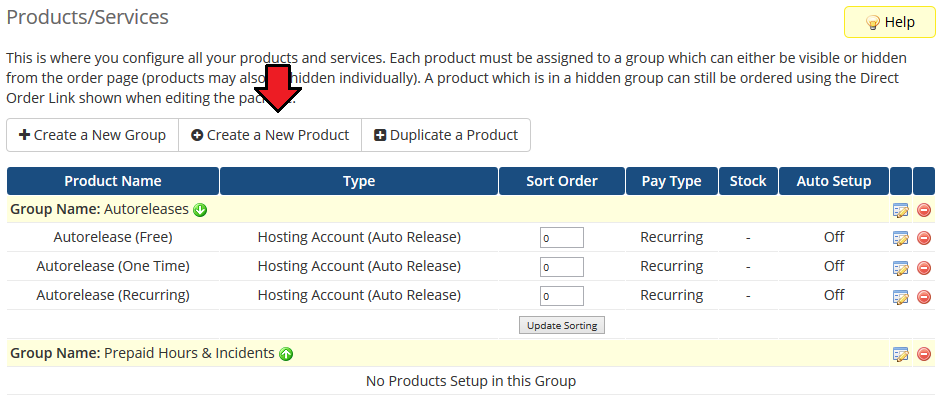
|
| Fill in a product name, choose the previously created group, and press 'Continue'. |

|
| Uncheck the 'Require Domain' checkbox and proceed to the 'Pricing' tab. |
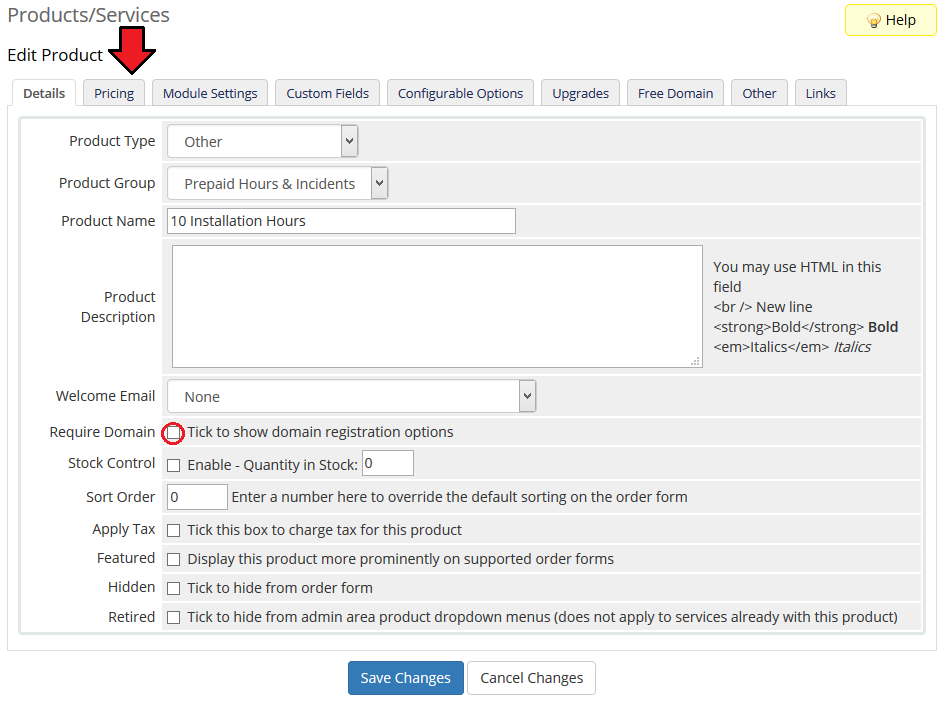
|
| Choose a payment type, enable wanted billing cycles, and fill in a price for each of them. Now, go to the 'Module Settings' tab. |
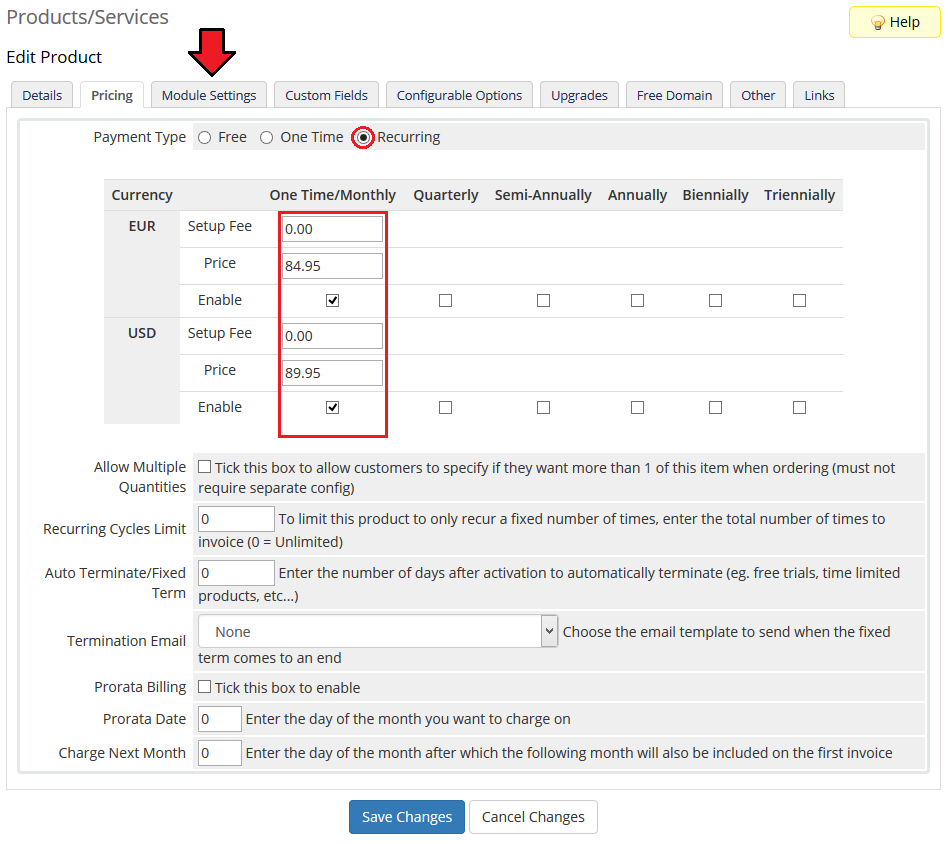
|
| Choose the 'TimeTrackingPrepaid' module from the 'Module Name' dropdown menu. Afterward, fill in the number of prepaid hours and incidents this product will grant to clients and press 'Save Changes'. |
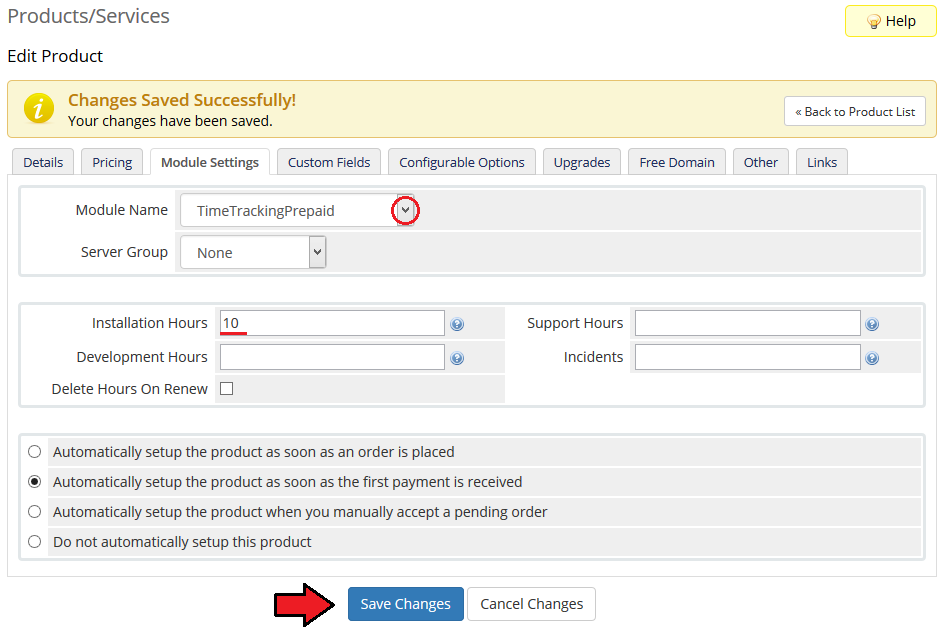
|
Assigning Configurable Options
| It is also possible to create and assign configurable options to the Time And Task Manager product. To set up your configurable options, proceed to 'System Settings' → 'Products/Services' → 'Configurable Options' → 'Create New Group'.
When creating single options, you may choose between three types of them: 'Dropdown', 'Radio' and 'Quantity'. |
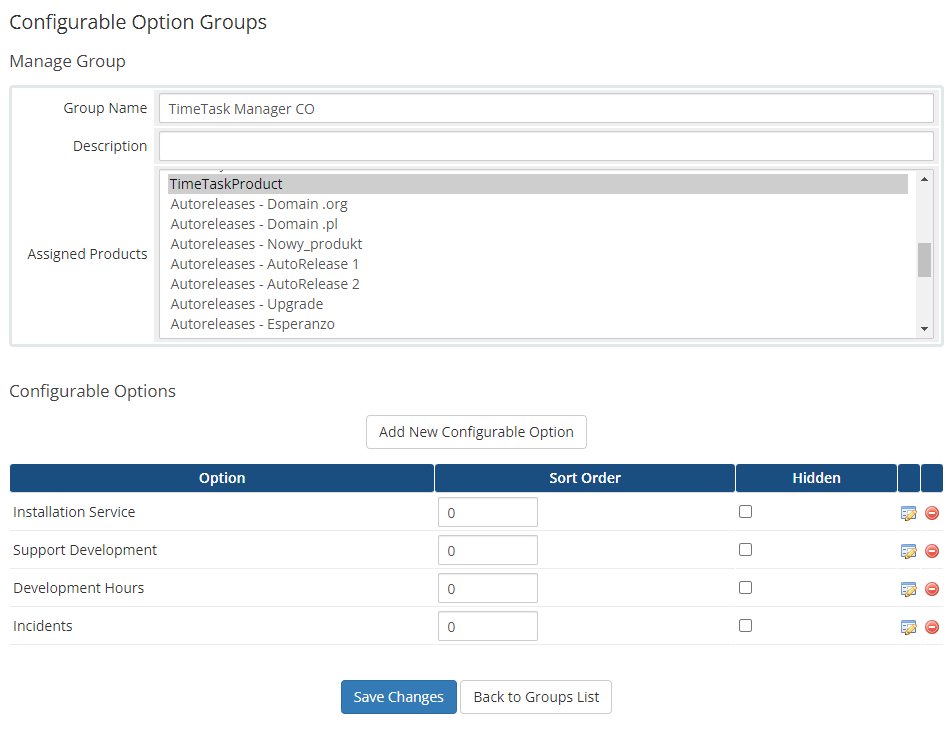
|
| When the group of configurable options is ready, move to the product again (System Settings → Products Services → Your product → Module Settings). There define which configurable option shall be assigned to the module options, by typing their names into the proper fields: |
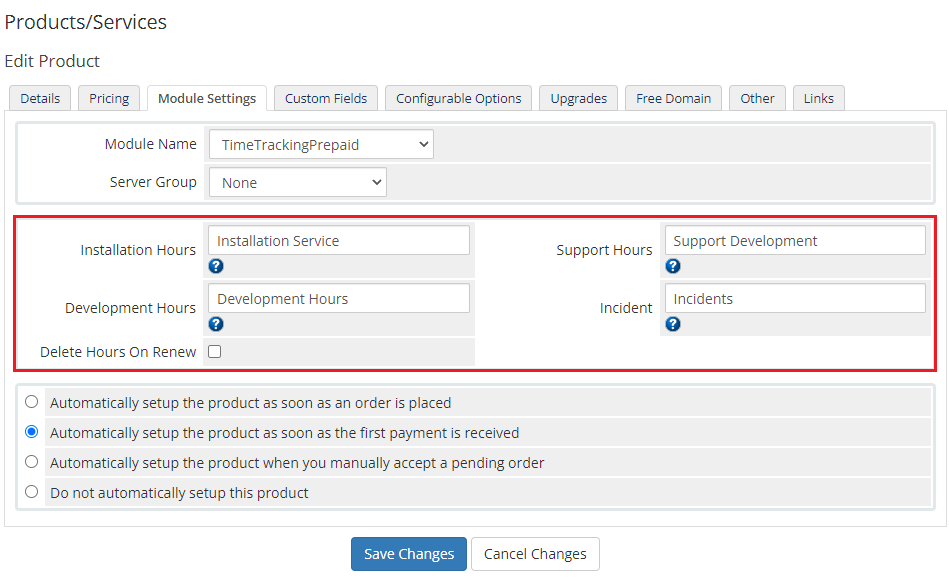
|
Addon
| Addon is the main part of the time tracking process. It is here where all the tasks and time entries are made. Additionally, from here you can create the tasks ordered by your clients, track the time spent on them, and bill your clients accordingly. |
Support Clients
| In the 'Support Clients' tab you are able to view the list of clients who bought prepaid hours of work or for whom accounts were created by your staff. |
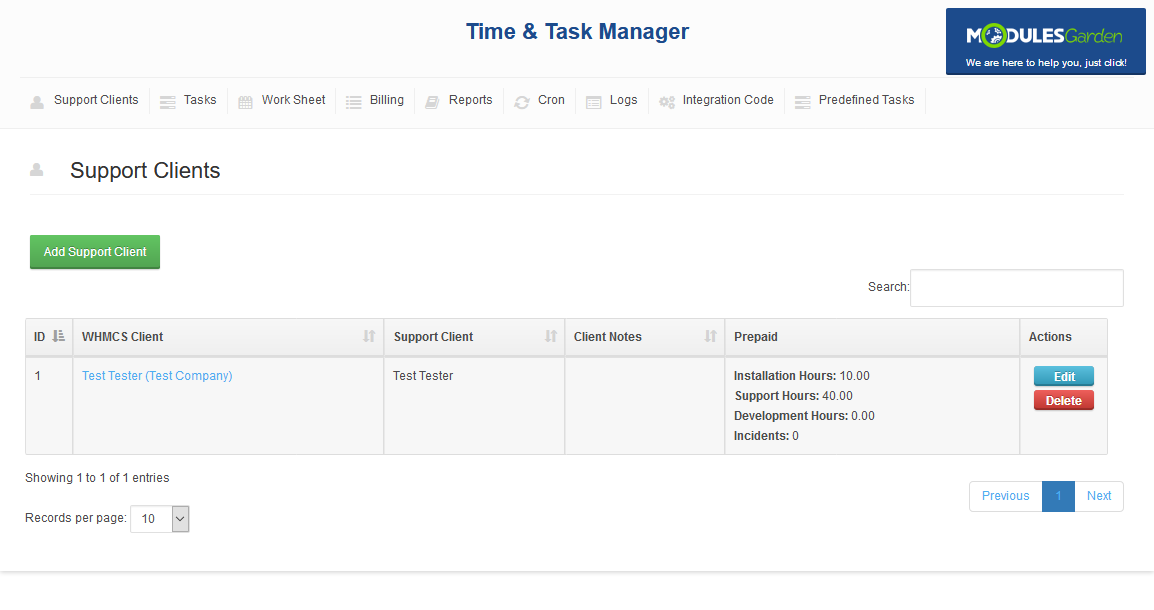
|
| Let's create an account for client Kate Cole, press 'Add Support Client' to proceed. |
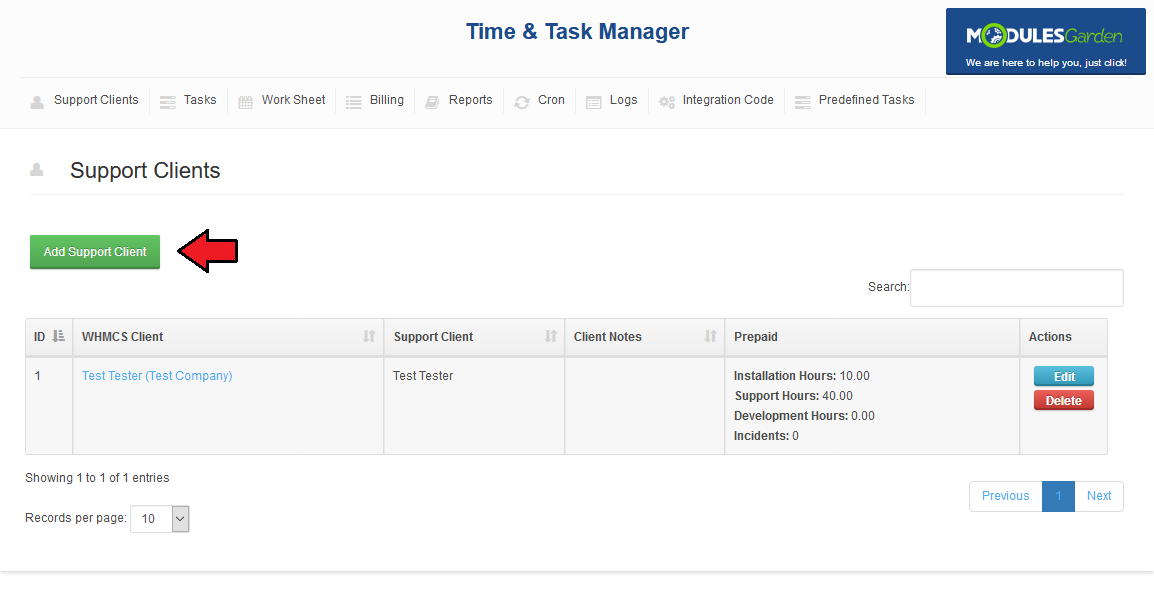
|
| Select a desired client from the 'WHMCS Client' dropdown menu and fill in the name under which the client will be visible in the addon. Additionally, you can add a note to this client. |
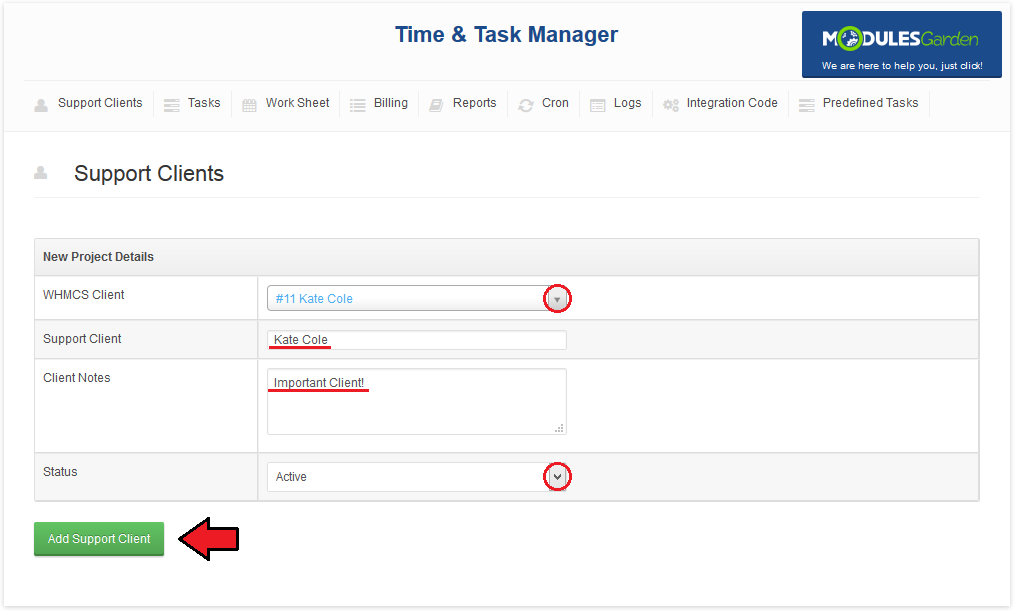
|
| By using the buttons marked on the following screen you can easily remove and edit support clients' accounts. |
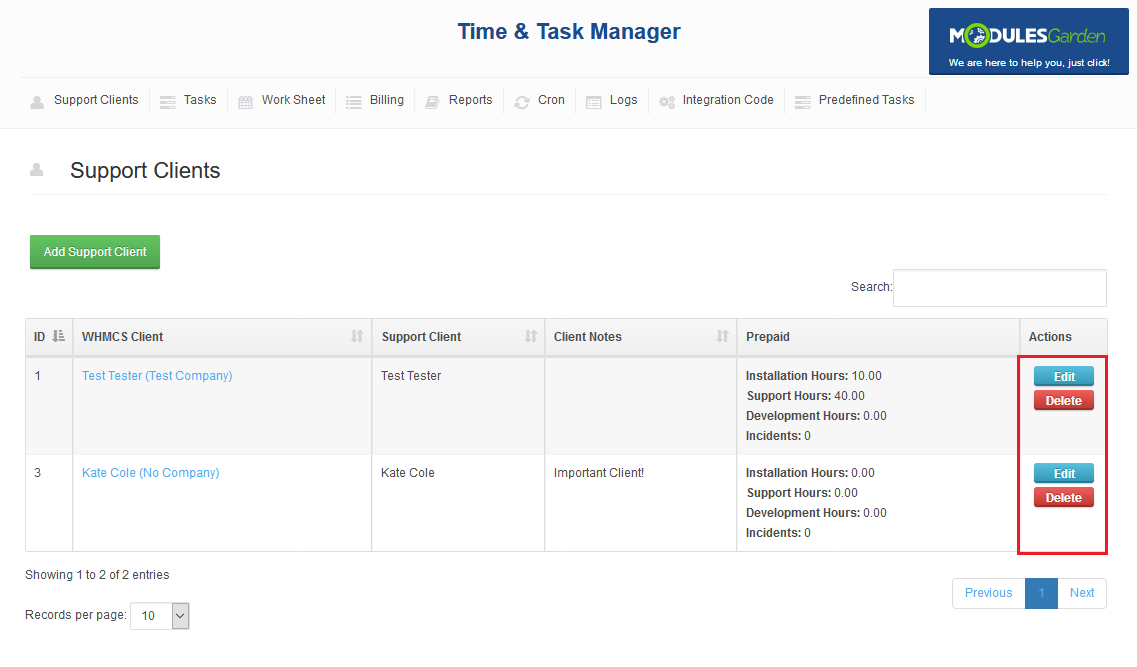
|
Tasks
| All tasks for which your clients can be billed are stored in the 'Tasks' tab. Press 'Add New Task' to create a new task. |
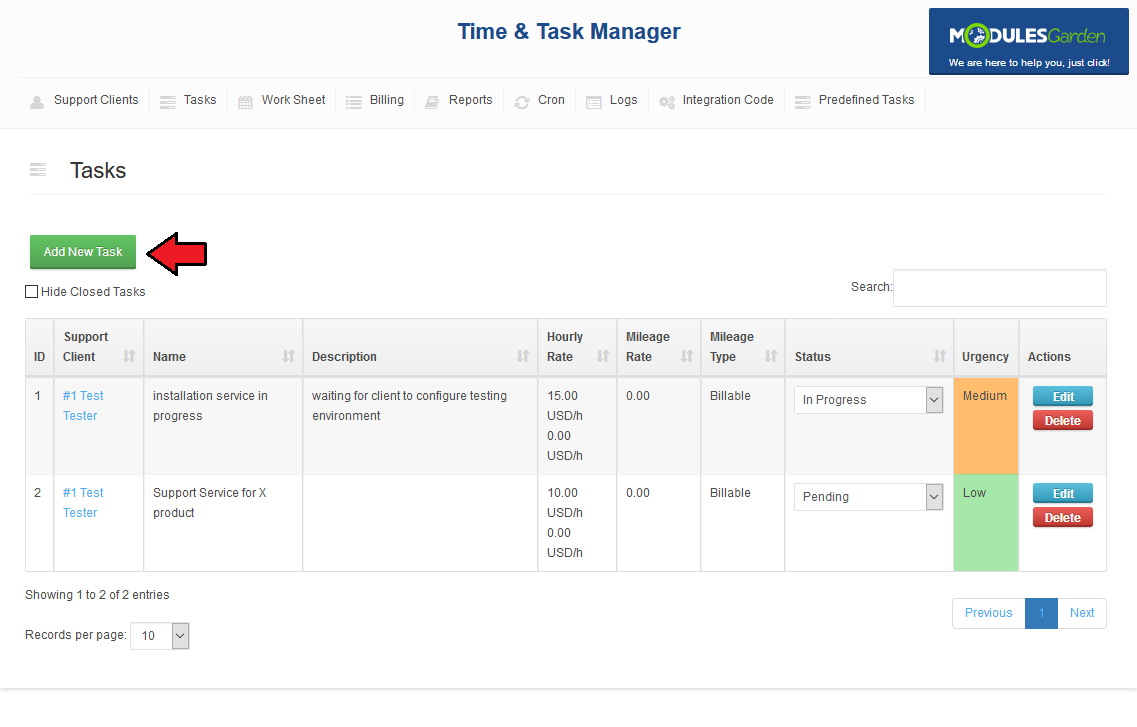
|
New Task
| Start by selecting one of the support clients and fill in a task name. Afterward, define payment for each hour spent on this task by selecting 'Charge From Prepaid Hours' or filling in the price into 'Hourly Rate'. Here you can also set up an |
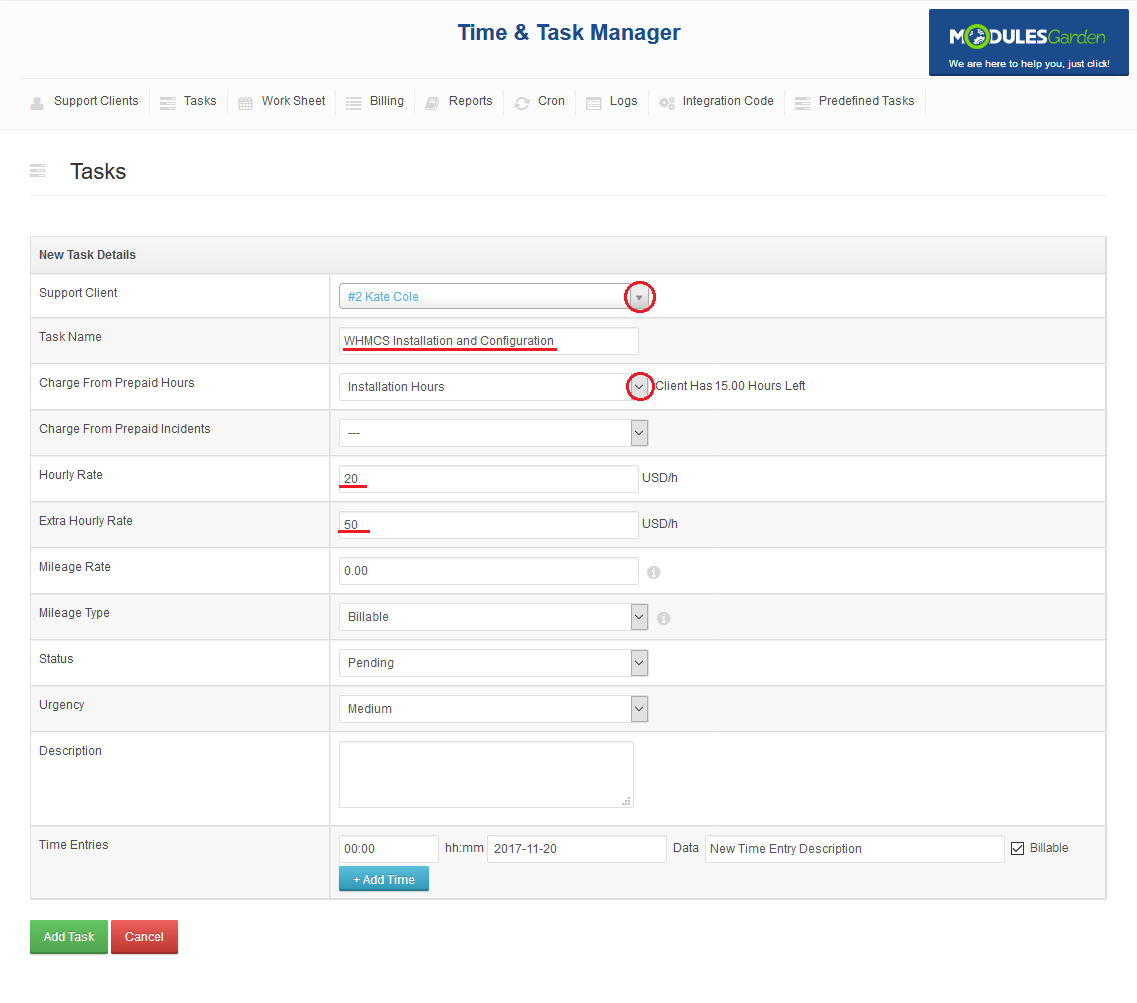
|
| You can also set up pricing for mileage. You can choose from three types of mileage:
|
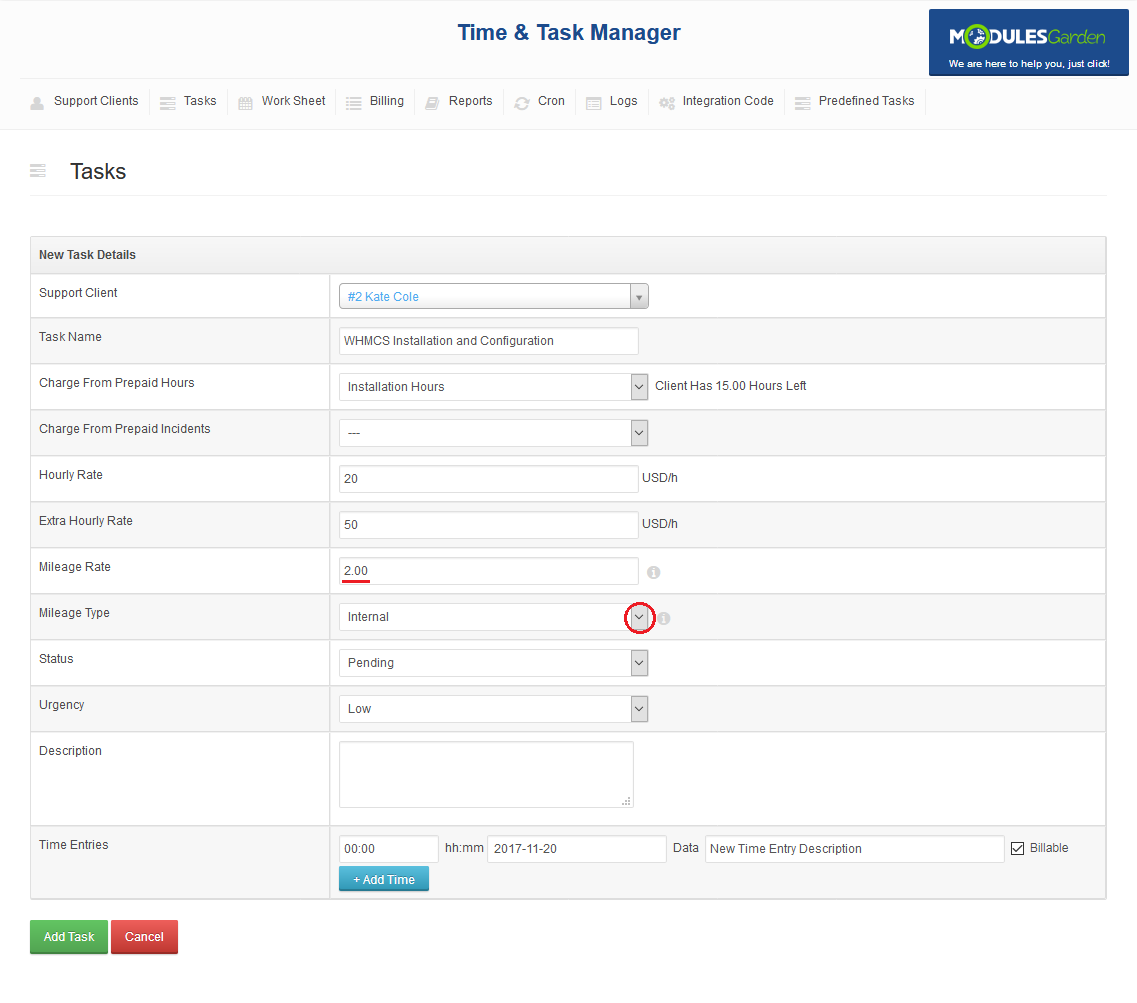
|
| Now, choose the task's status and urgency level, and fill in the description of the task. In addition, you can also add time entries, or do it later from the 'Work Sheet' tab view. Press 'Add Task' when ready. |
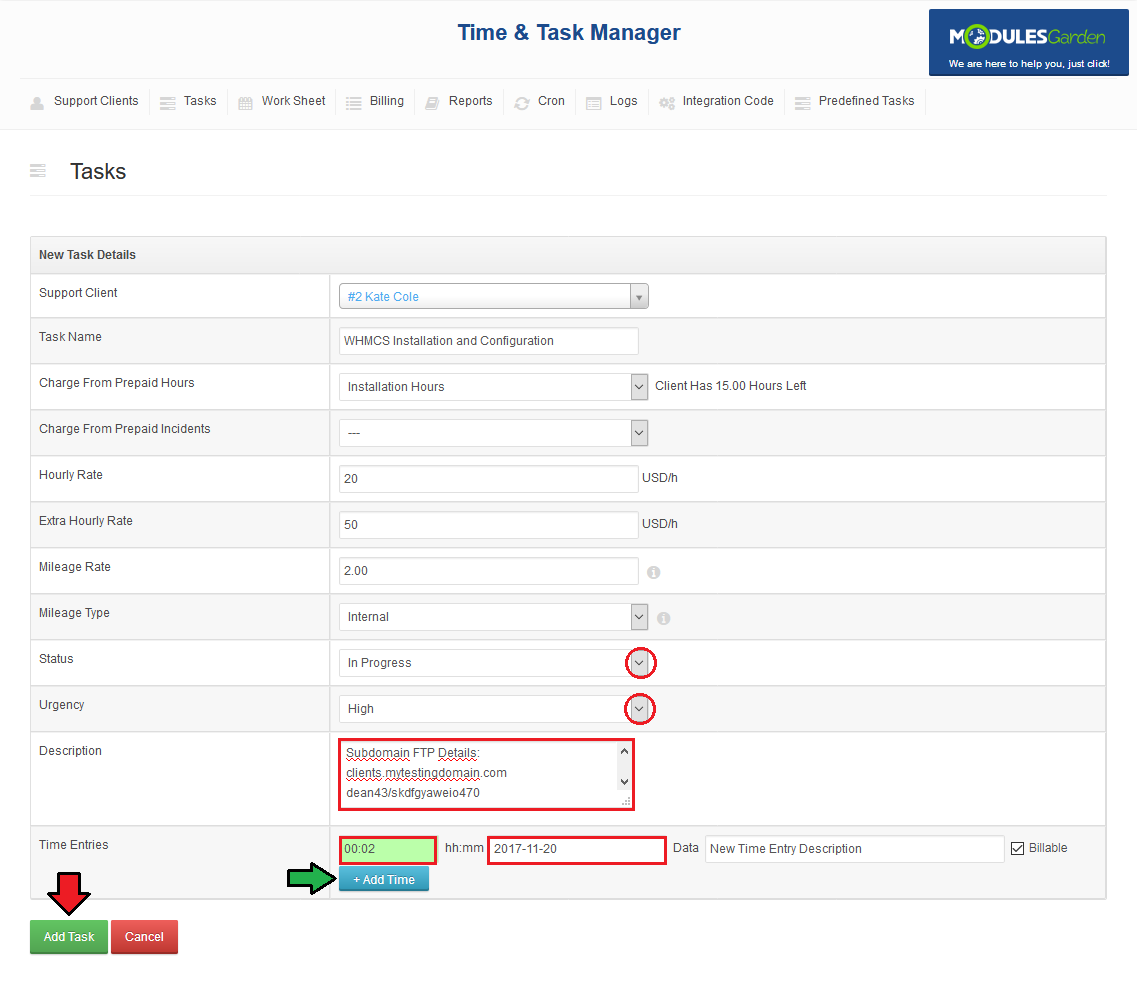
|
Work Sheet
| In 'Work Sheet' your staff members are able to report hours spent on existing tasks or create a new task by choosing one from the predefined tasks. |
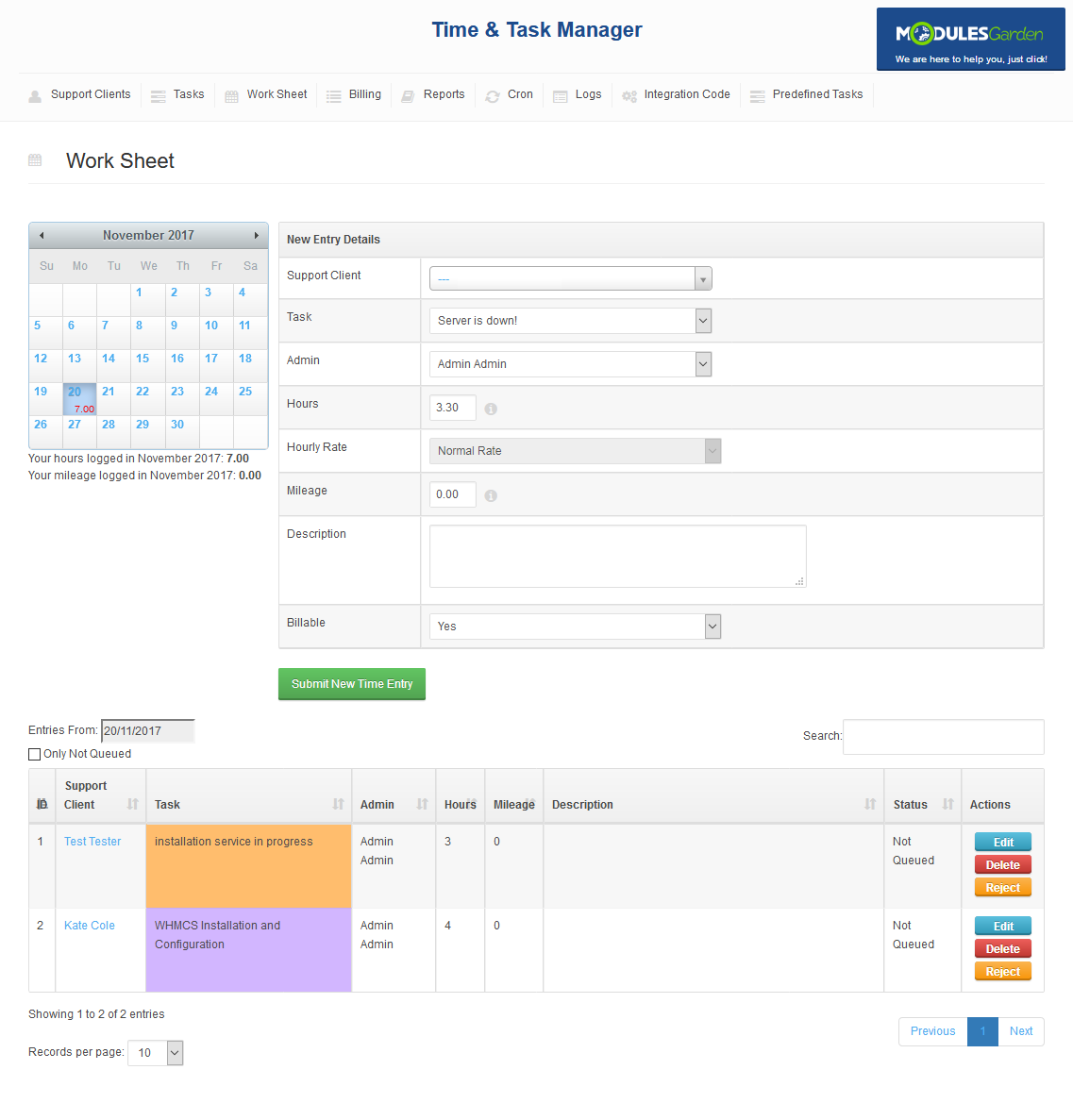
|
| Let's create a new entry for the previously created task. Each time you enter the 'Work Sheet' tab, a form to create a new entry will be already open. |
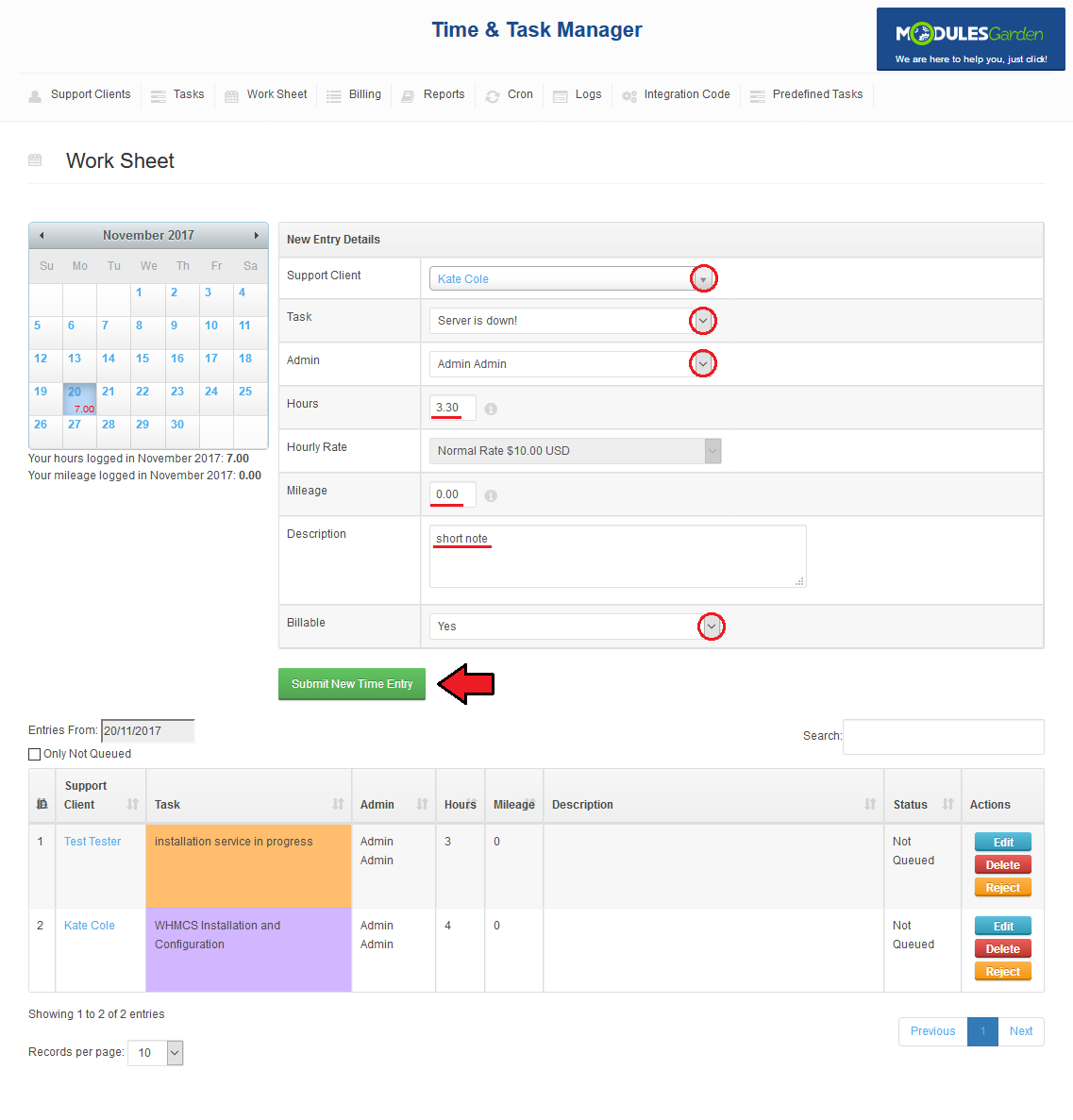
|
| Below you can find the list of tasks for the current day. In order to display tasks from the other day, select them in the calendar as shown on the following screen. |
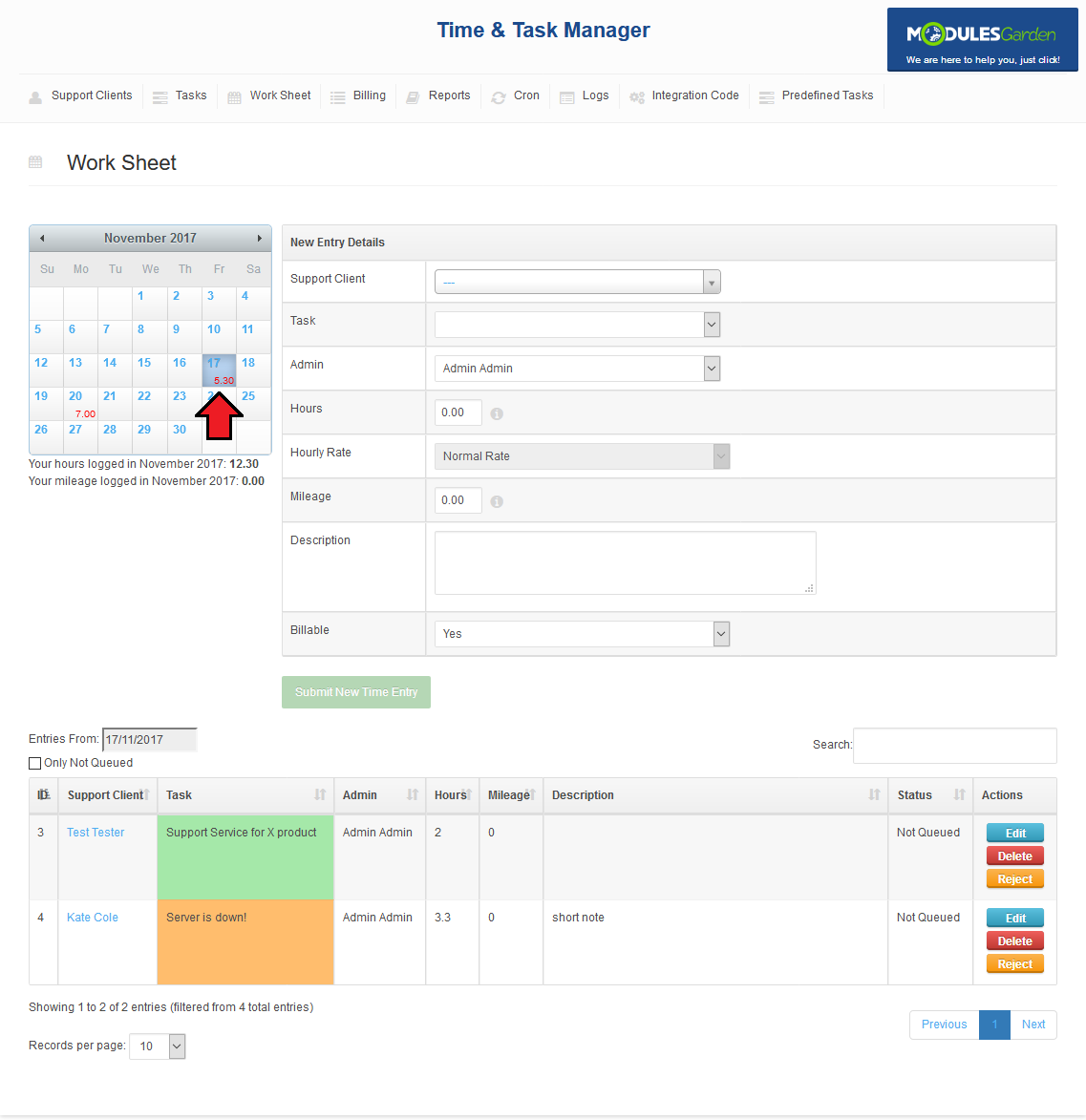
|
| All time entries can be afterward modified, removed, and rejected through using buttons marked on the following screen. |
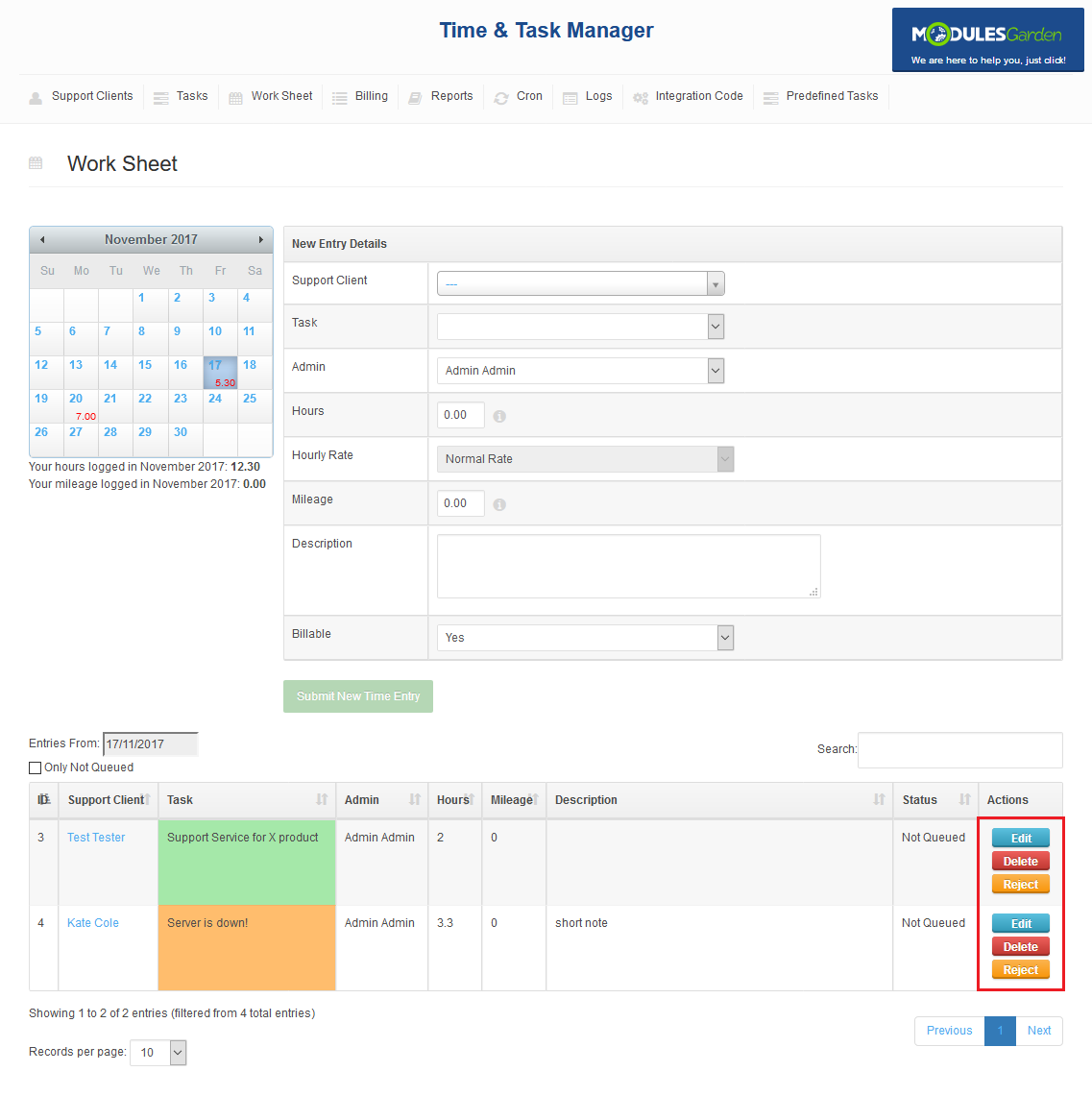
|
Billing
| Finally, it is time to show you the place where you can generate invoices for the time spent on your clients' tasks. As you can see, here you can find billing for a single time entry with detailed information about each of them. |
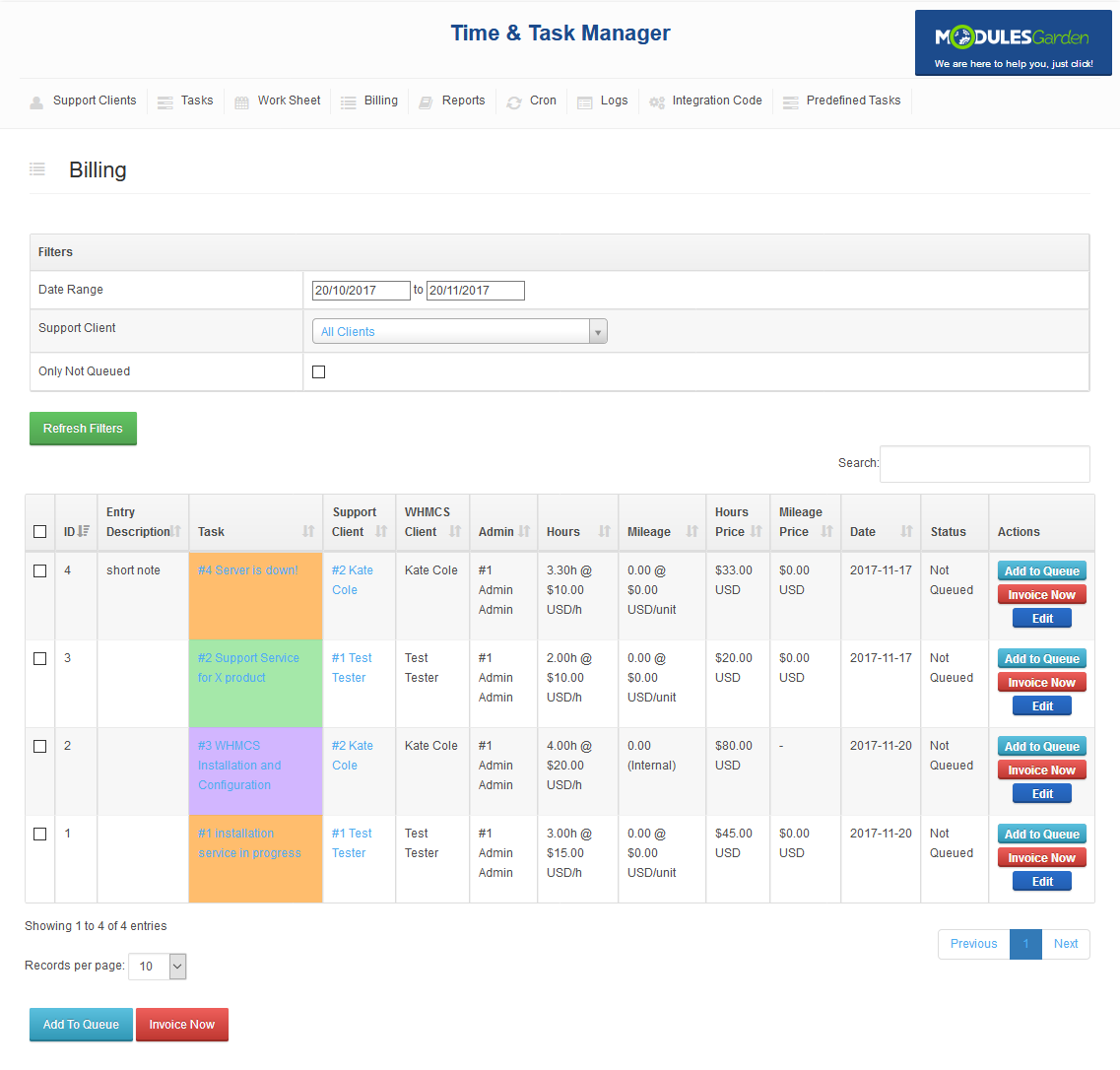
|
| Let's generate an invoice for client Kate Cole from the time entries created this week. Start by filling in the correct time period choose Kate Cole from the 'Support Client' dropdown menu and press 'Refresh Filters'. |
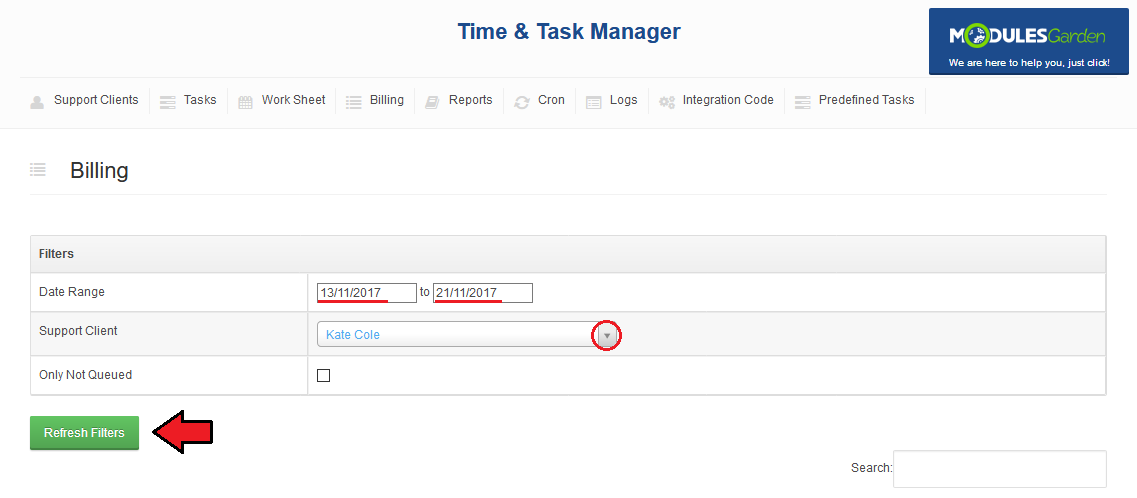
|
| As you can see, only the desired time entries are displayed. If you wish to display entries that are not scheduled cron jobs, tick the 'Only Not Queued' box. |
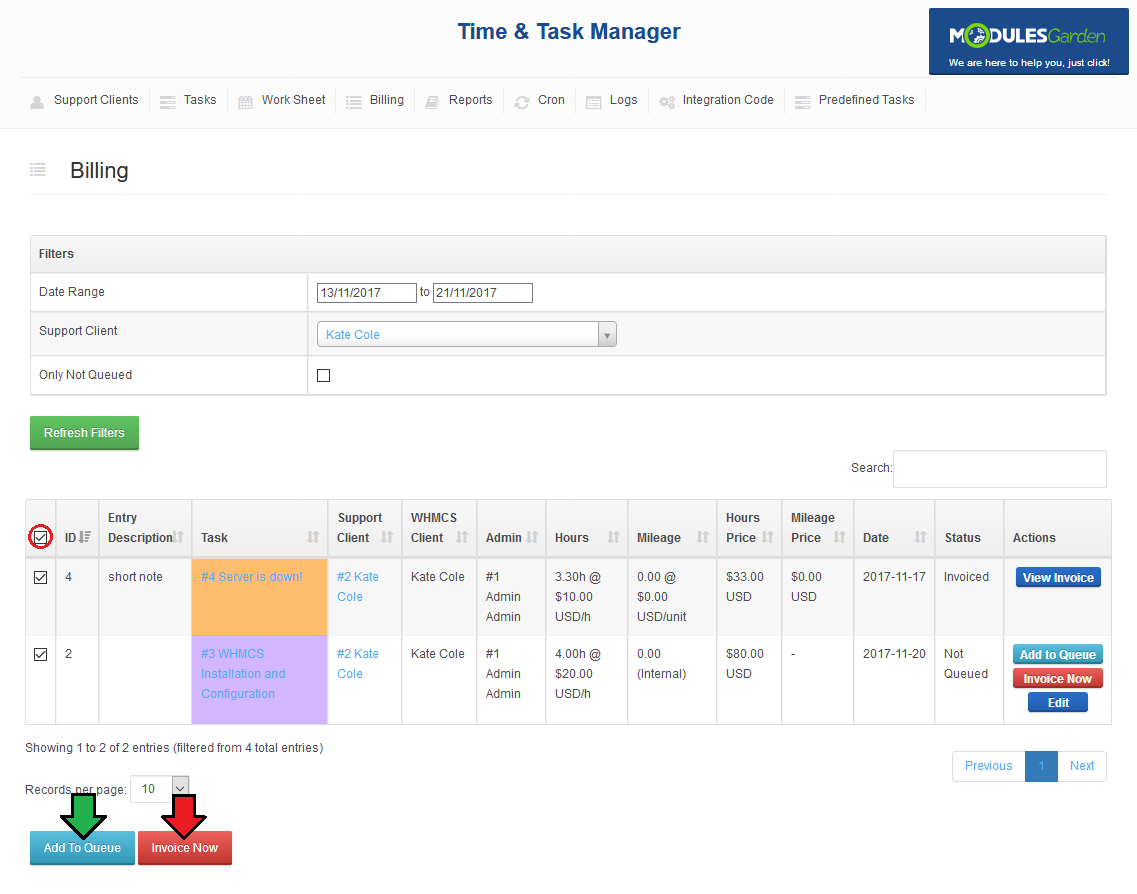
|
| Generated invoice records contain information in the format defined in the module configuration. Note: Prices inside of the addon are displayed based on the default WHMCS currency. |
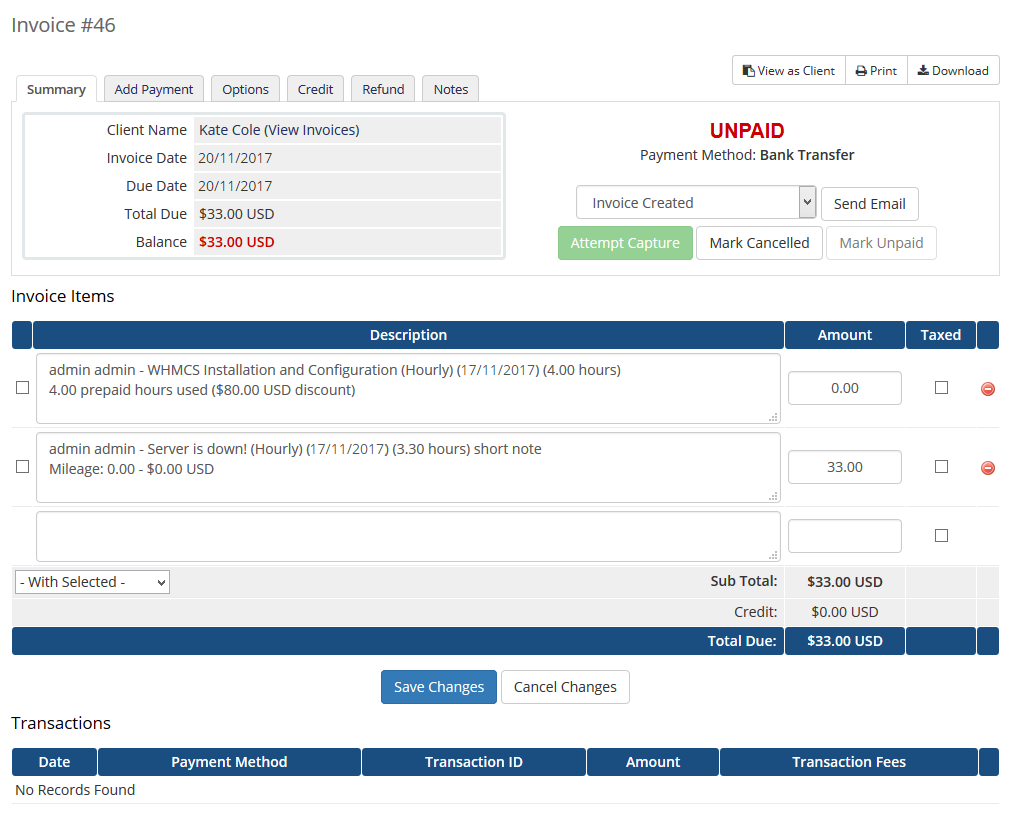
|
Reports
| You can easily generate reports of the work done for your clients. Proceed to the 'Reports' tab to do so. |
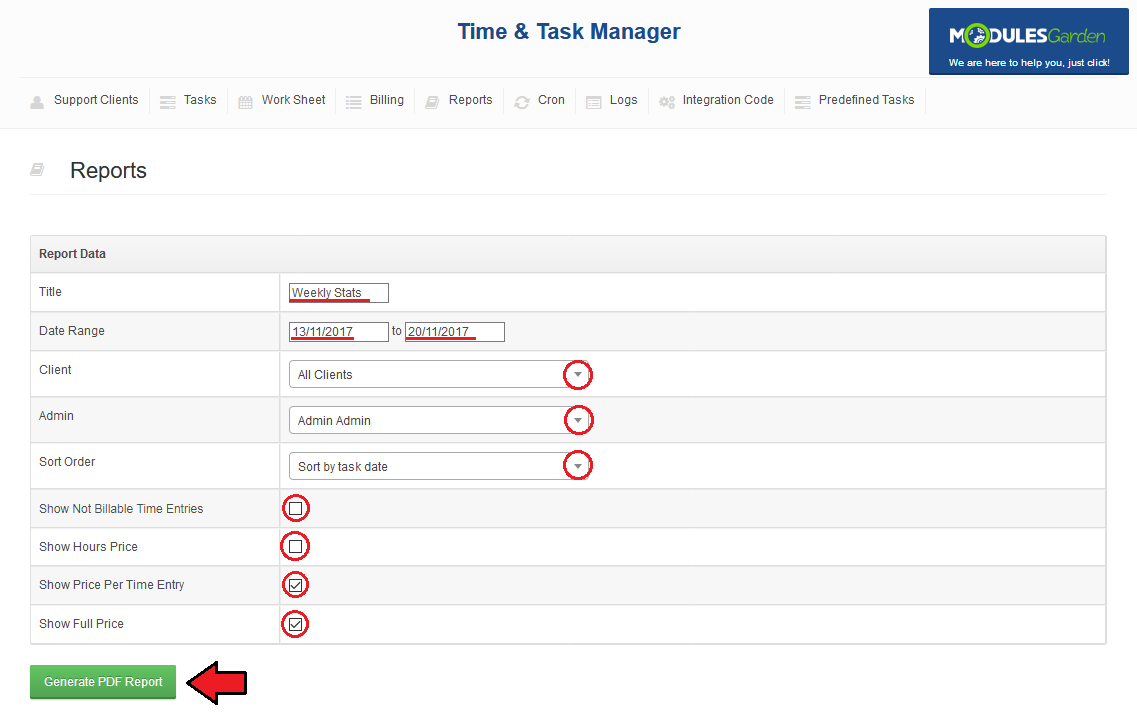
|
| On the following screen you can see the report for the client Test Tester. |
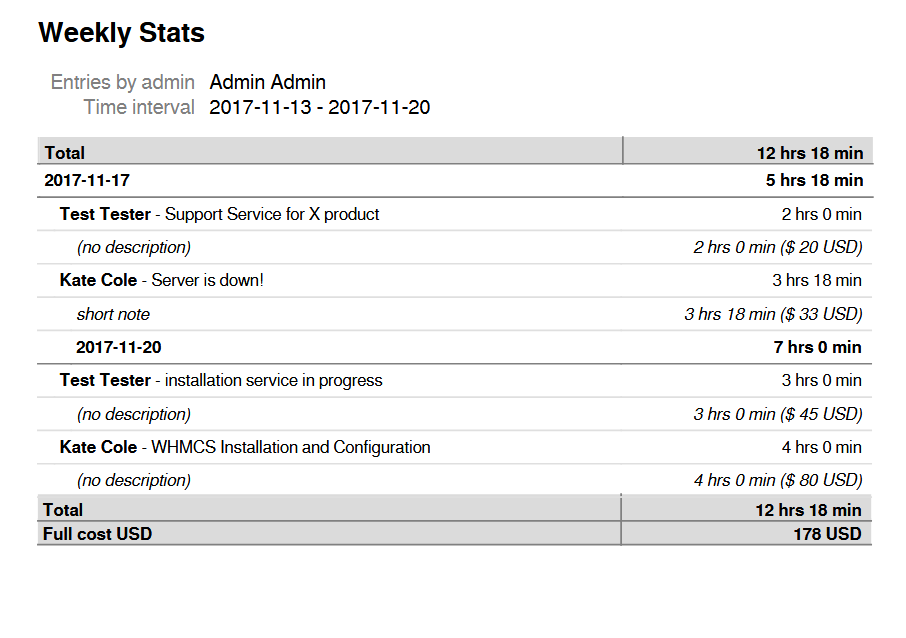
|
Cron
| In the cron tab you can define the behavior of cron, find the path to cron, view all queued entries, and manually invoice them. 1. To alter cron behavior, choose the desired option from 'Cron Billing Action' as shown on the following screen. Important: Remember to set the cron task to run at least once a day. |
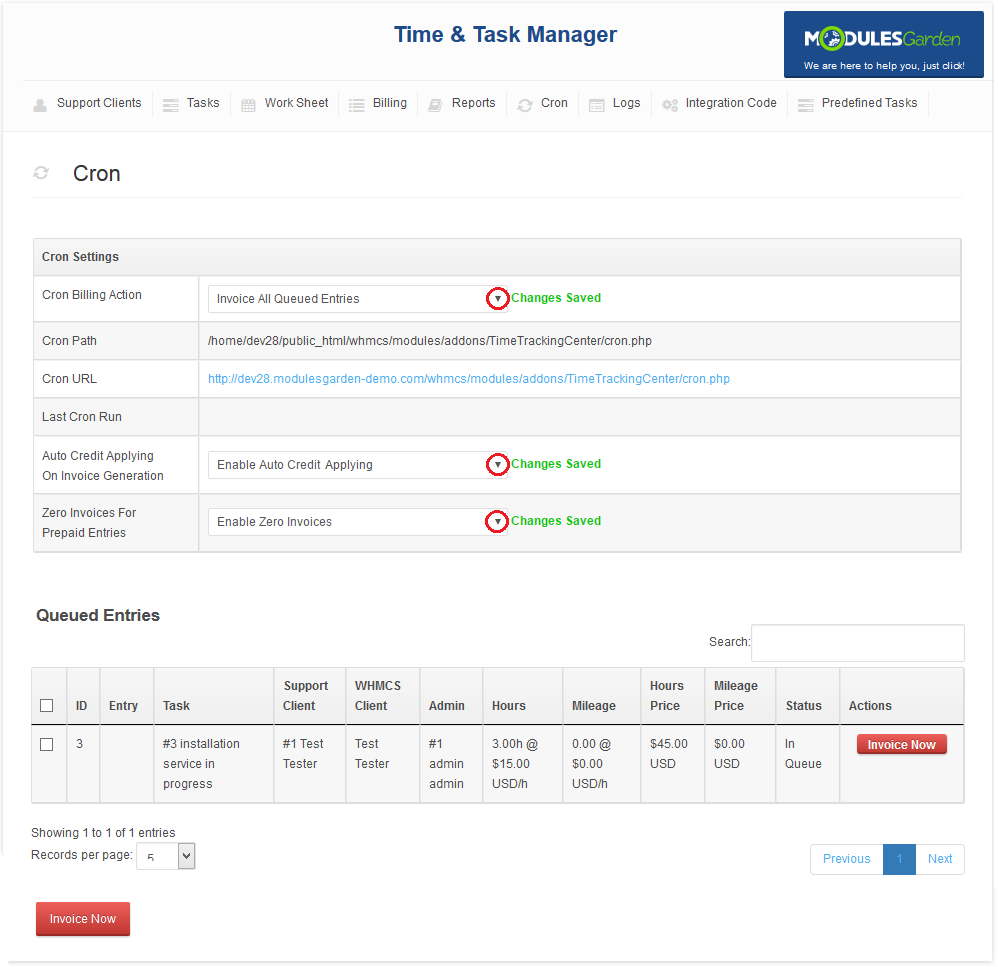
|
Logs
| The 'Logs' tab contains the logs of all the actions made inside of Time & Task Manager For WHMCS. There are two columns similar to each other, 'Data' and 'Old Data'. |
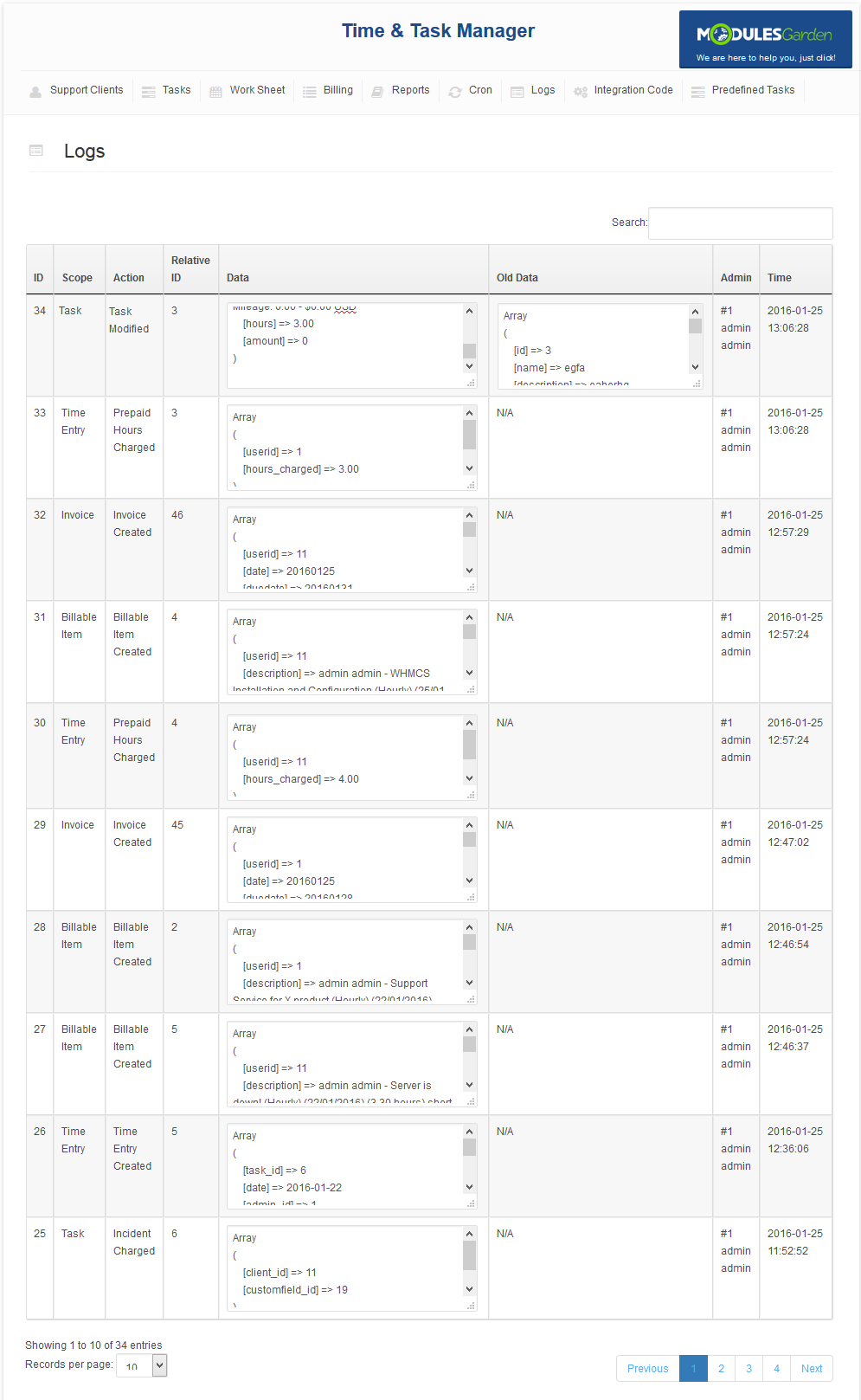
|
Integration Code
| Follow the integration code, shown below, to display tasks and prepaid hours in your client area. The exact line number might change, but what is important is that the integration code: |
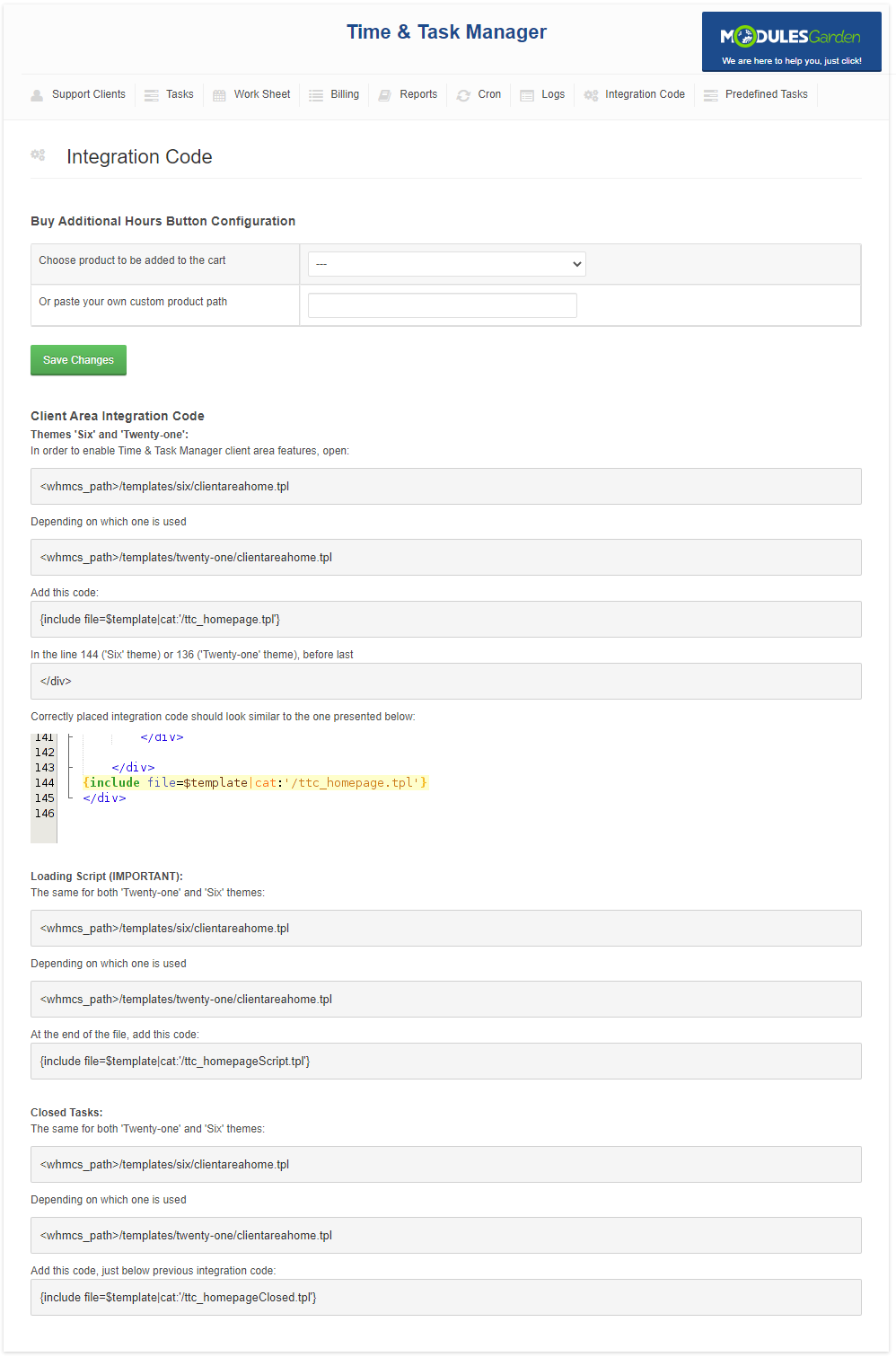
|
| Here you can also select a product from the list of your available ones that will be by default added to a cart if a client decides to purchase some additional hours. Read more about this option here. |
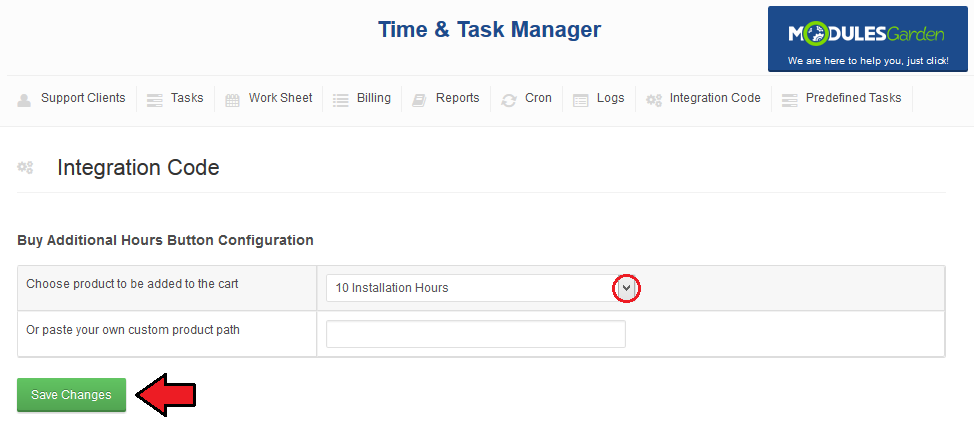
|
| If all the integration codes have been inserted correctly, this is how the Client Area home page should look like. On the screen below you can see a list of open and closed tasks and the button to purchase additional hours. |
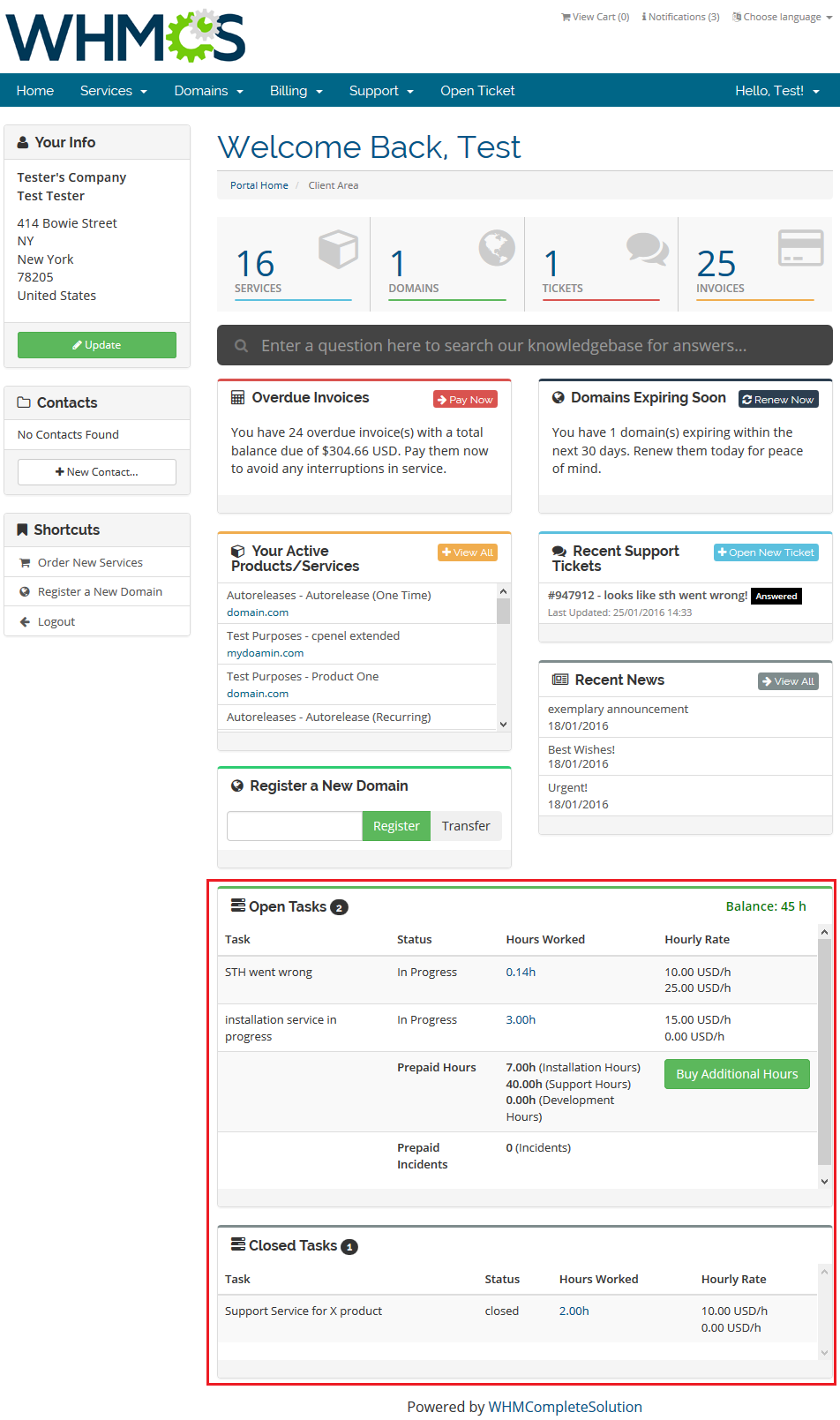
|
Predefined Tasks
| On the 'Predefined Tasks' page you are able to set up predefined tasks. Those tasks can be used to instantly create new tasks during the creation of a worksheet entry. |
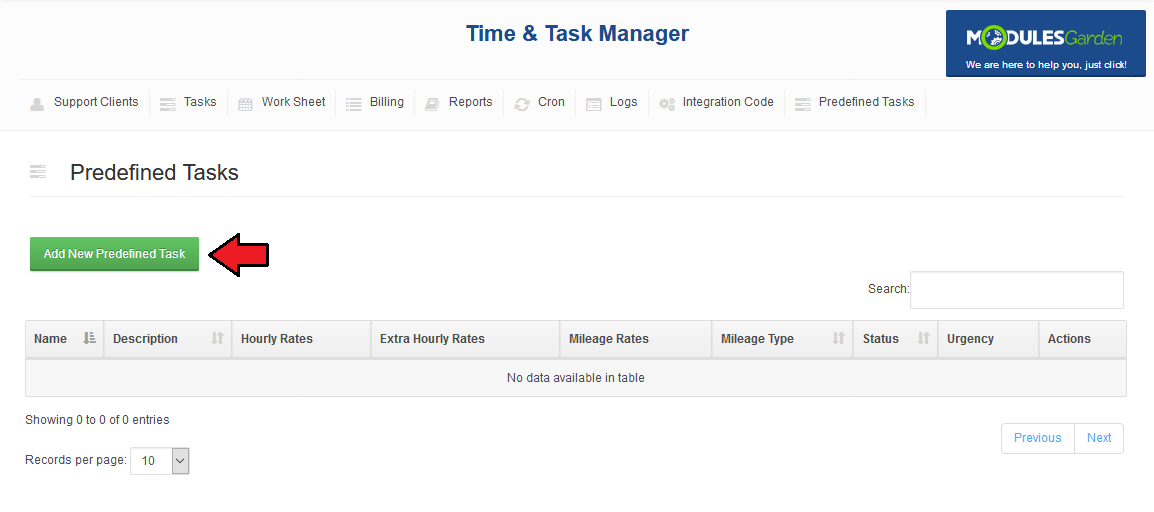
|
| Now, fill in a predefined task name, hourly rate and an extra hourly rate, price per mileage, and a description. Additionally, choose prepaid hours (optional), mileage type, and the initial status of the task. |
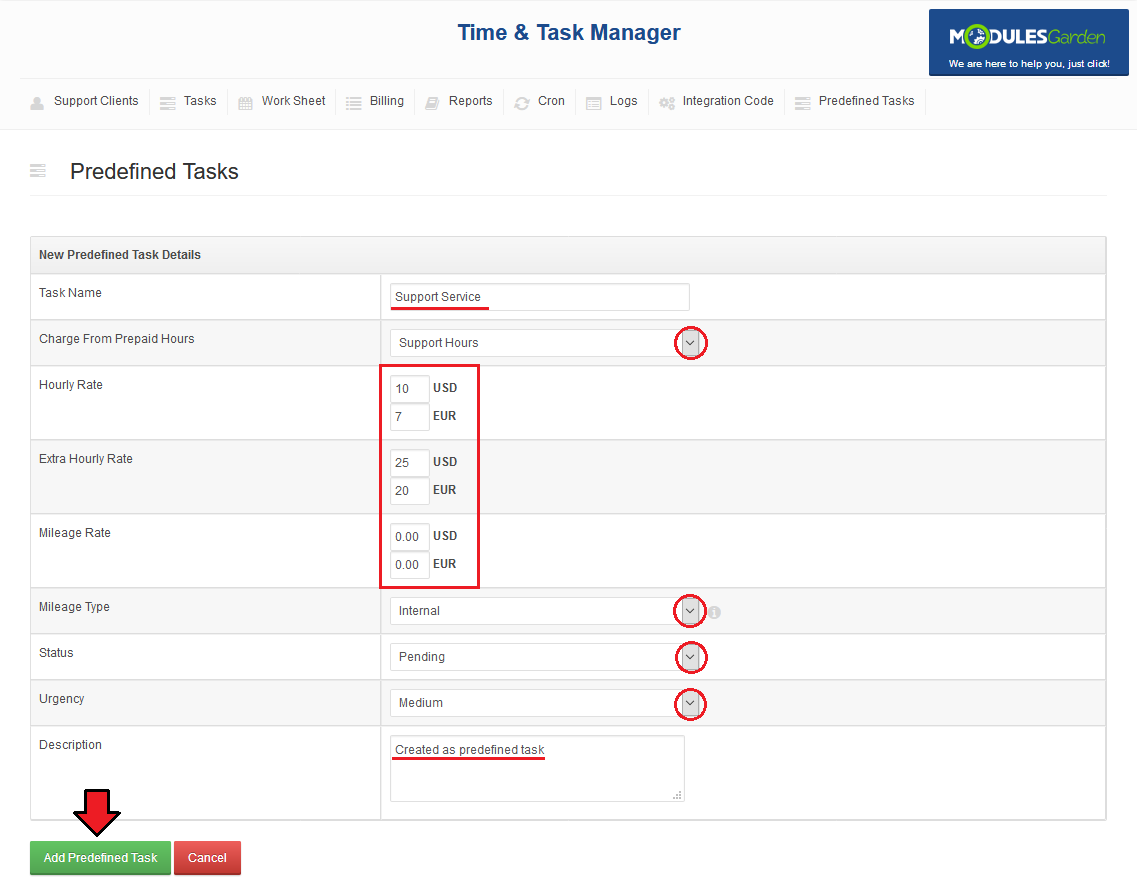
|
| You can manage the predefined tasks the same way you manage the regular tasks. |
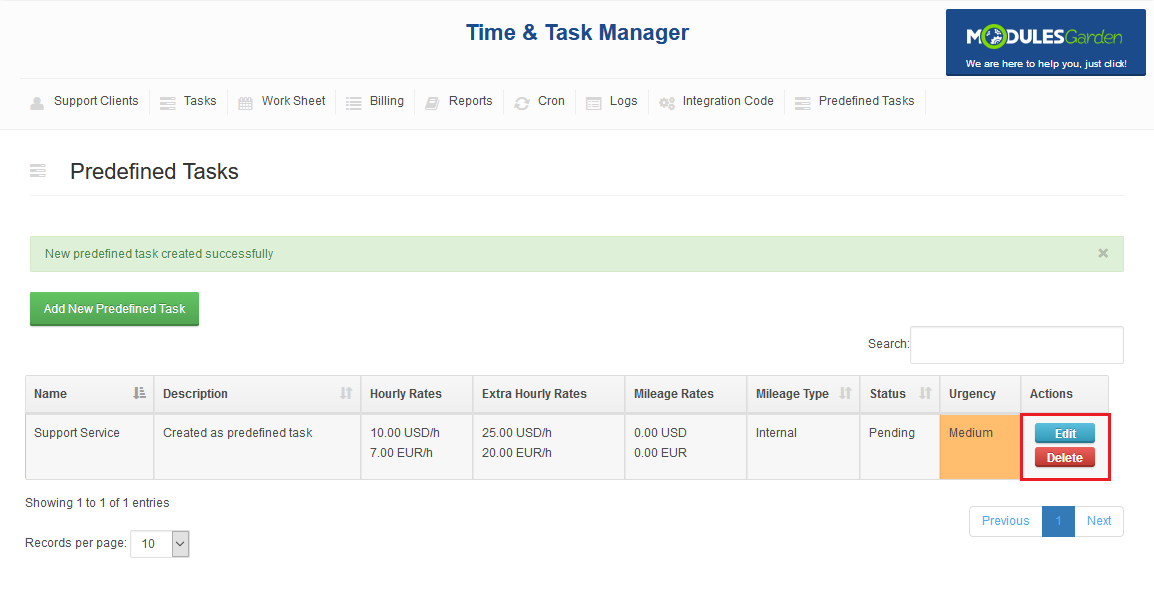
|
| On the following screen you can see how the predefined tasks look in a new work entry form. |
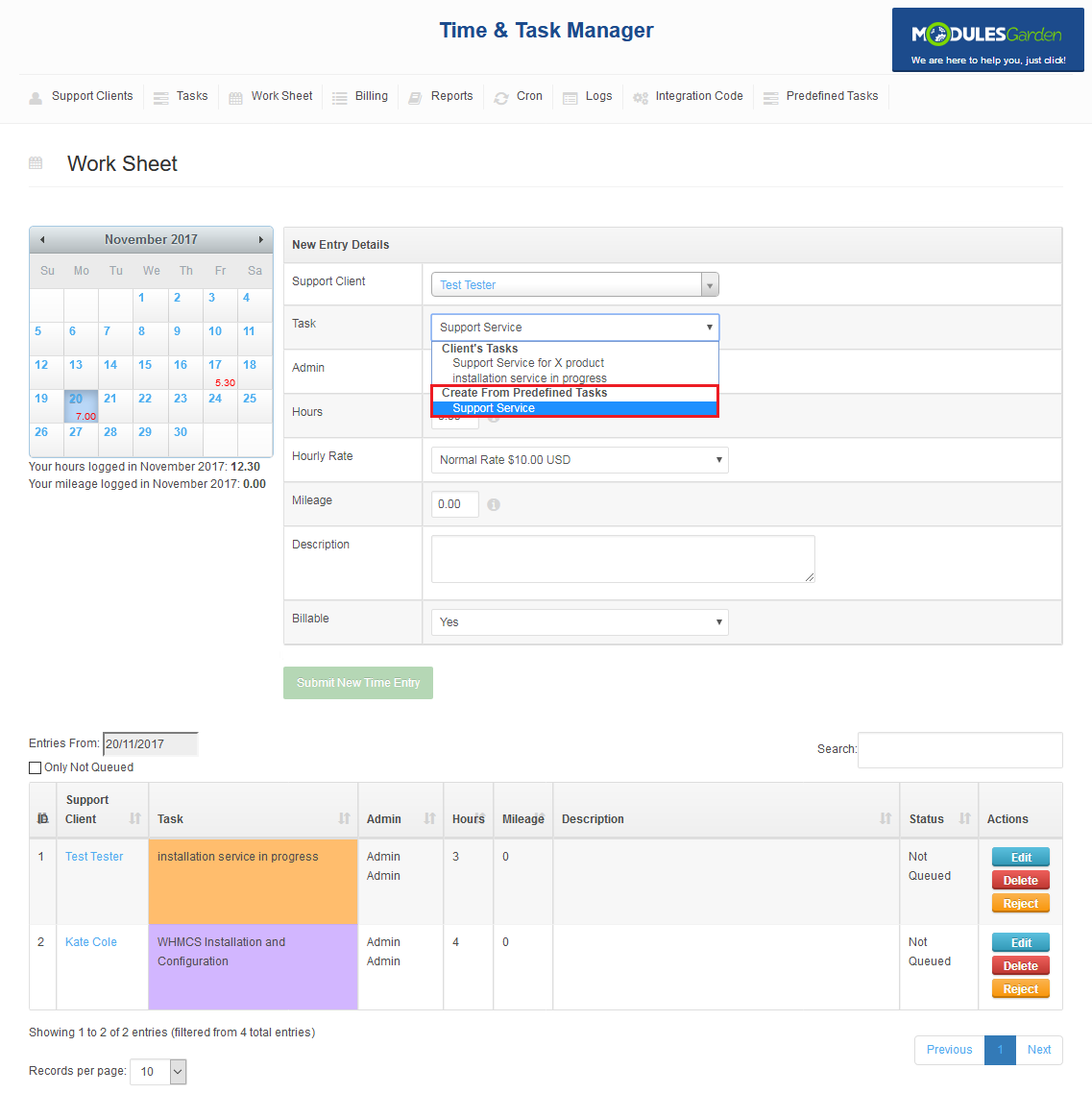
|
Support Integration
| Owing to the integration with the support department, your staff members can easily create a task that will be assigned to a ticket. |
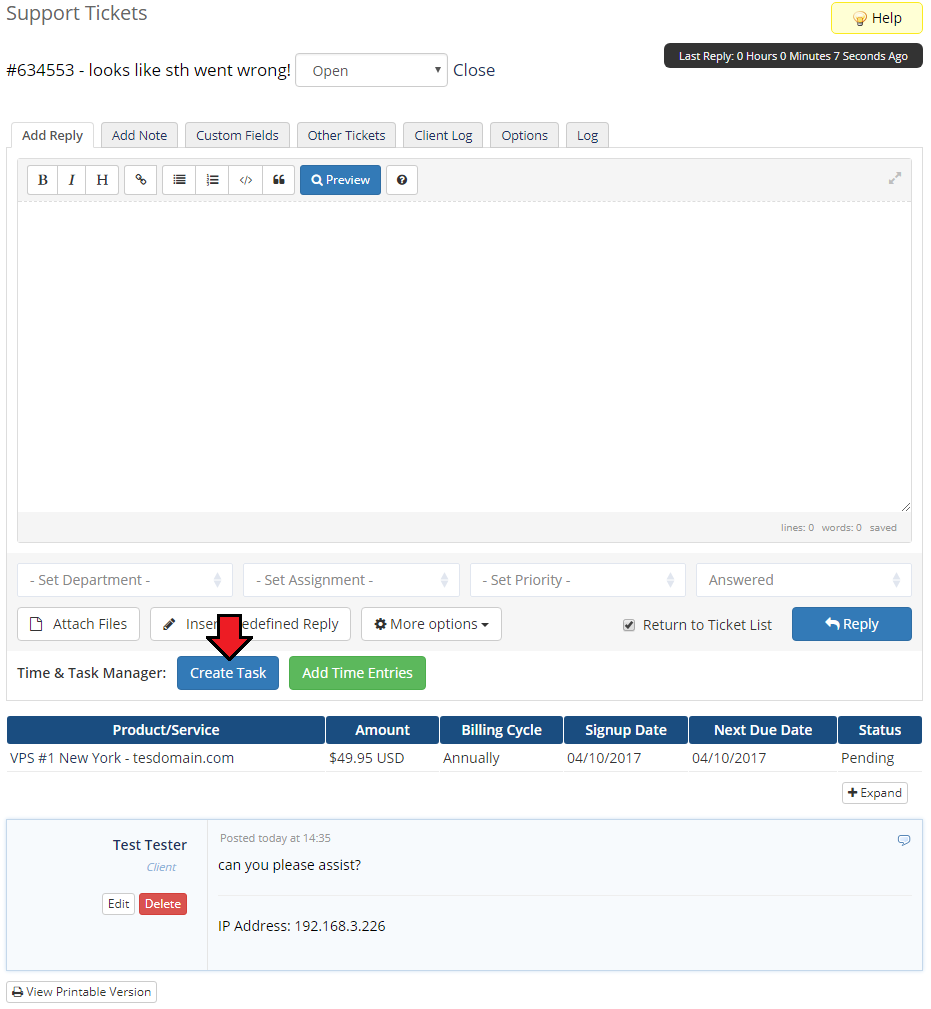
|
| Ticket tasks are created in the same manner as the regular tasks. As you can see on the screen below the only difference is the direct link to the ticket. |
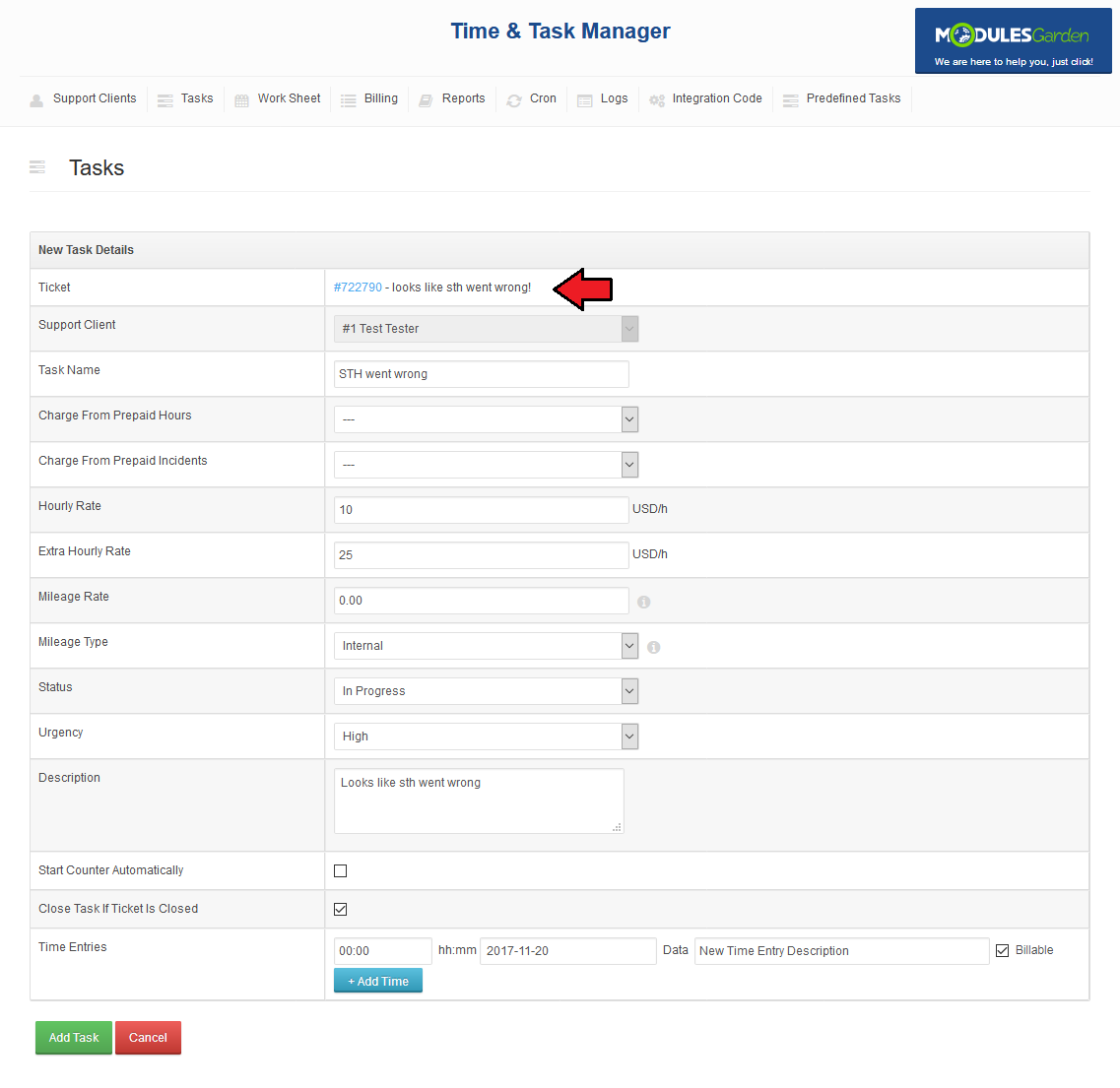
|
| As soon as you get back to the ticket, you will notice that the 'Create Task' button has changed to 'Edit Task'. There are also options to 'Start Counter' (if it was not started automatically) , 'Show Report' and 'Add Time Entries' . |
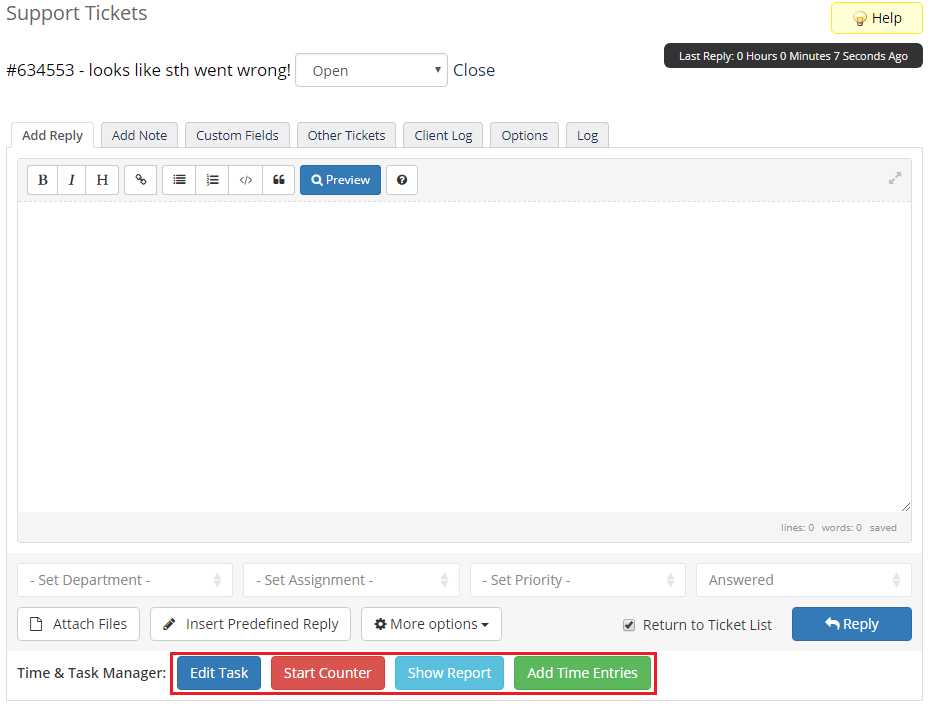
|
| At this point, you may also start the counter and begin counting hours spent on solving a given ticket. |
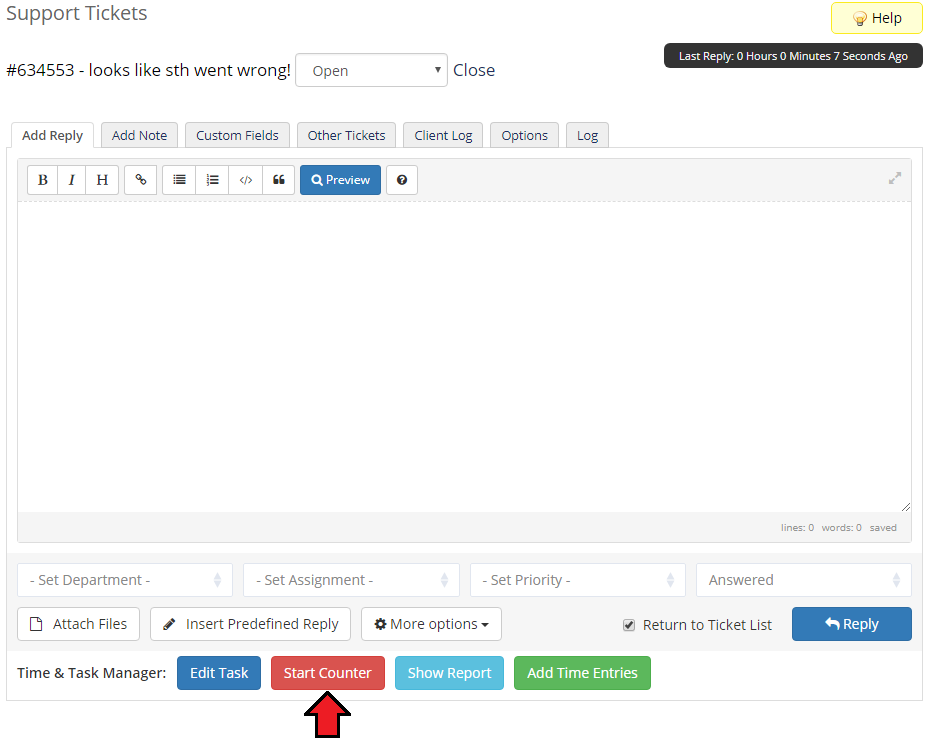
|
| Control the time while solving a ticket, when you are done press 'Add Response' and the timer will stop. |
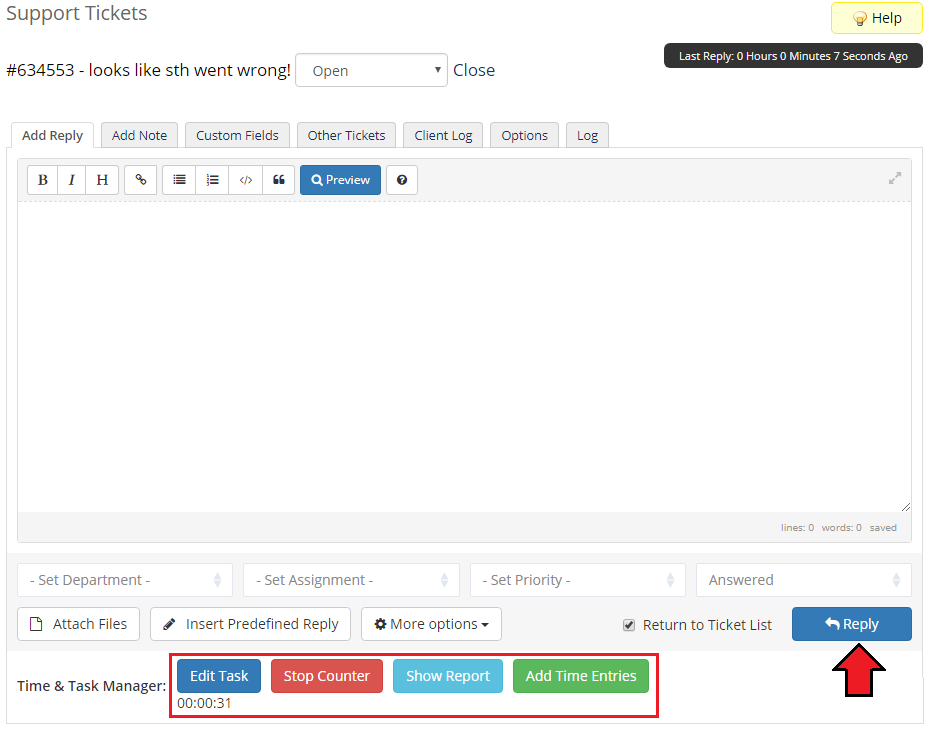
|
| Select whether you want to bill the client for the time spent on solving the ticket, and choose the rate (normal or extra if set up). |
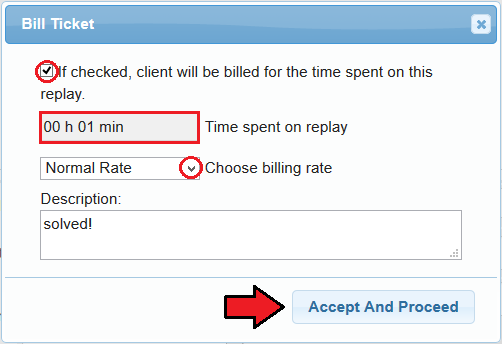
|
| You may also preview this task report from this point. |
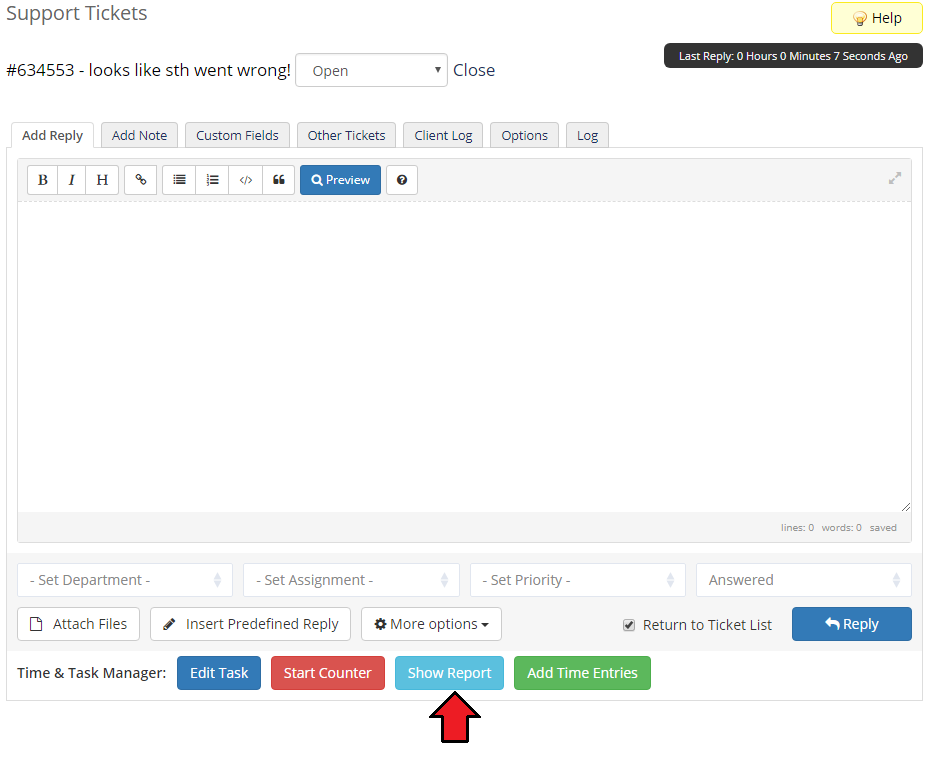
|
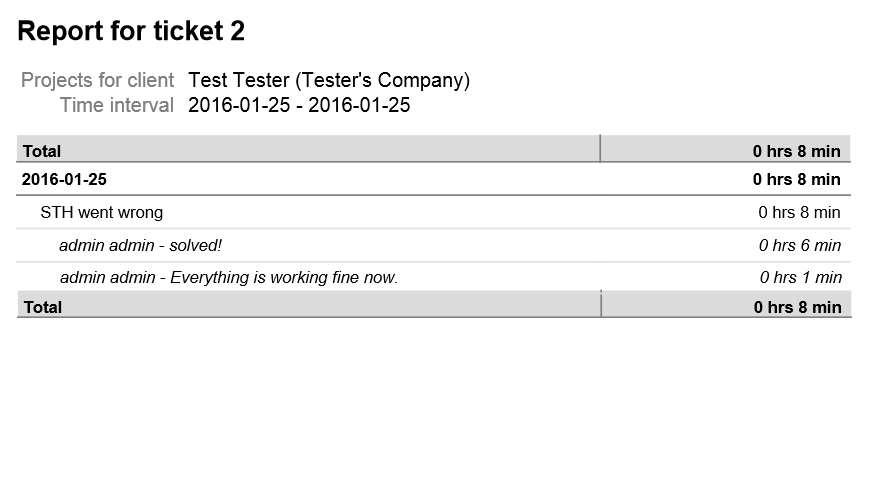
|
| The 'Add Time Entries' button allows the operator to add a new time entry directly from a given task. |
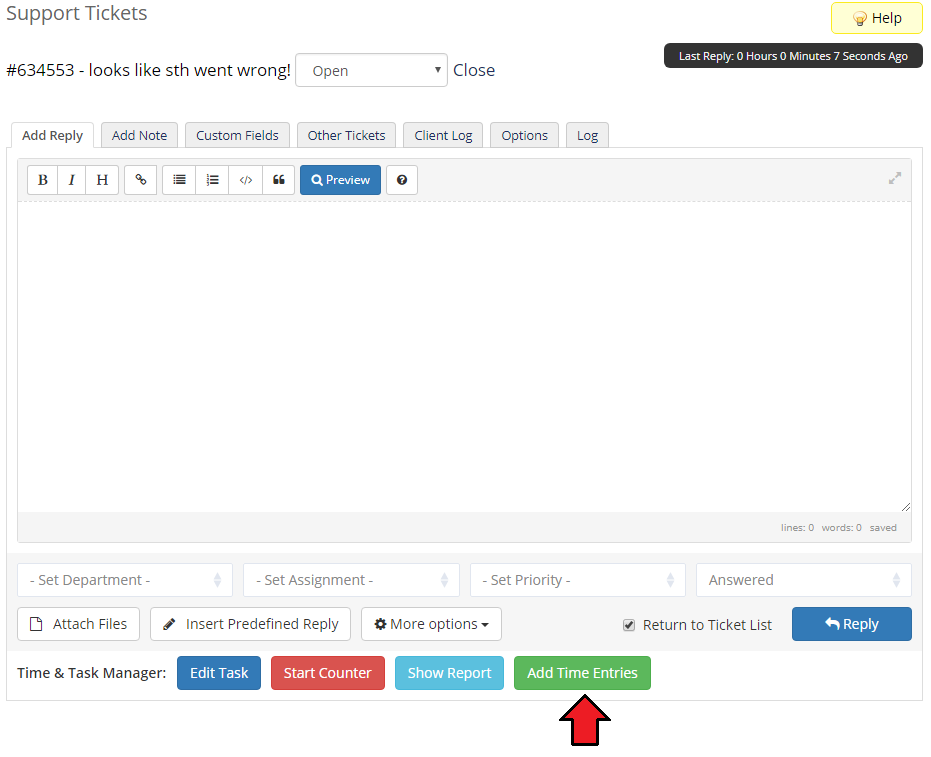
|
| Note that the entries created in this way will be settled at the default rates set in part 7 of the addon configuration. In this way, the support operator may still add entries, but without the possibility of modifying the rates or even accessing the Time And Task Manager addon. |
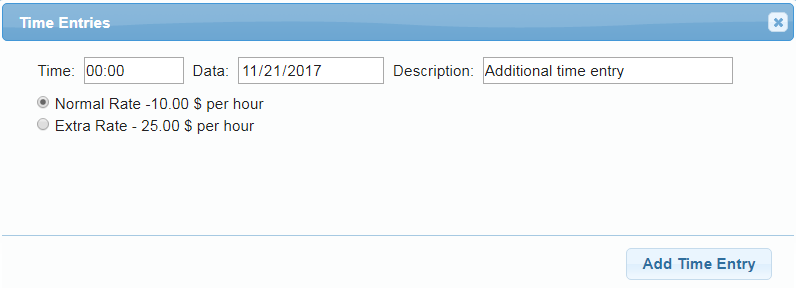
|
Client Area
| In the client area your clients can view all the unused prepaid hours and incidents. In the top right-hand corner of the tab, there is also a current balance of either available or exceeded hours. |
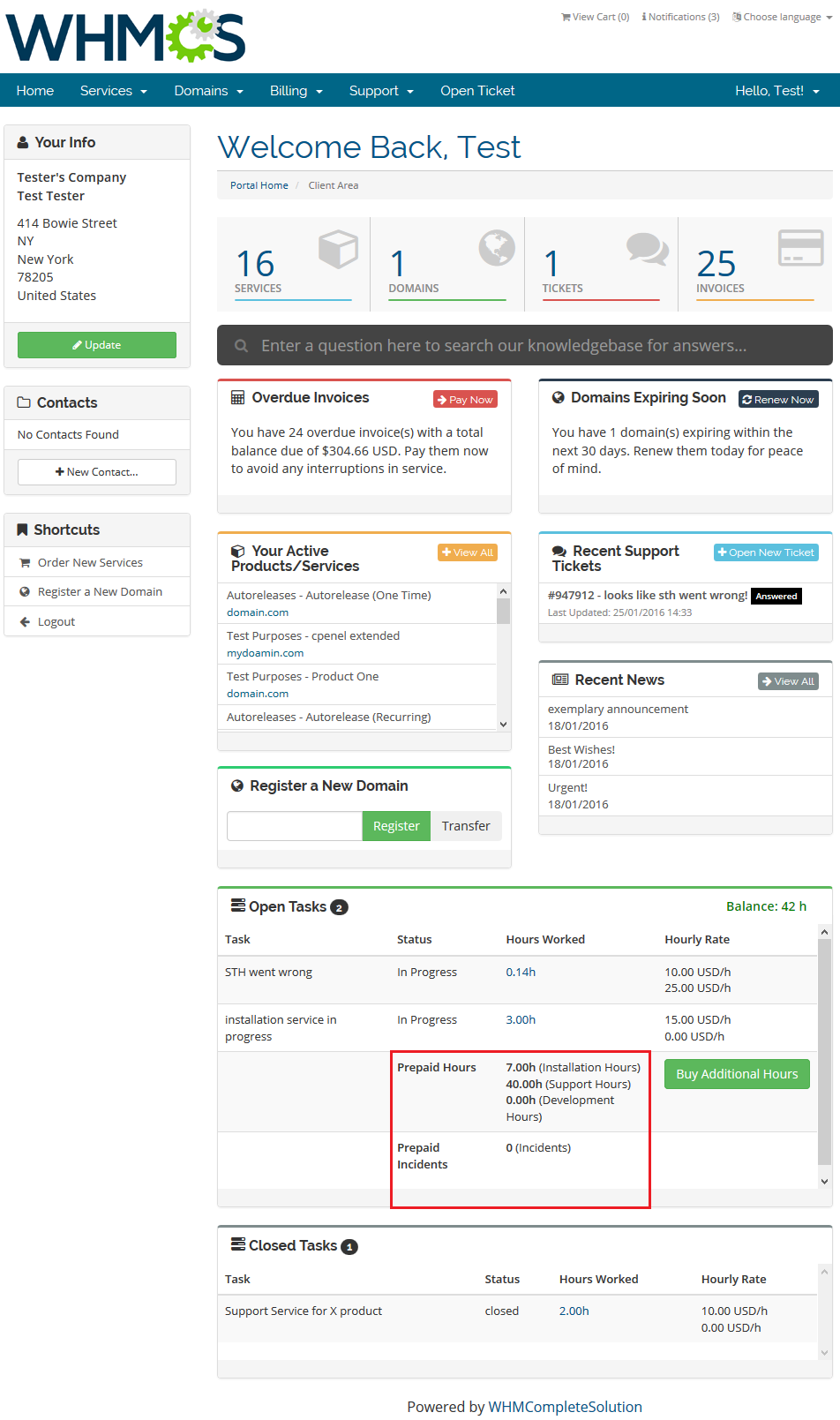
|
| Additionally, they can see the tasks concerning them with basic information like a current status, hours spent on it, and an hourly billing rate. |
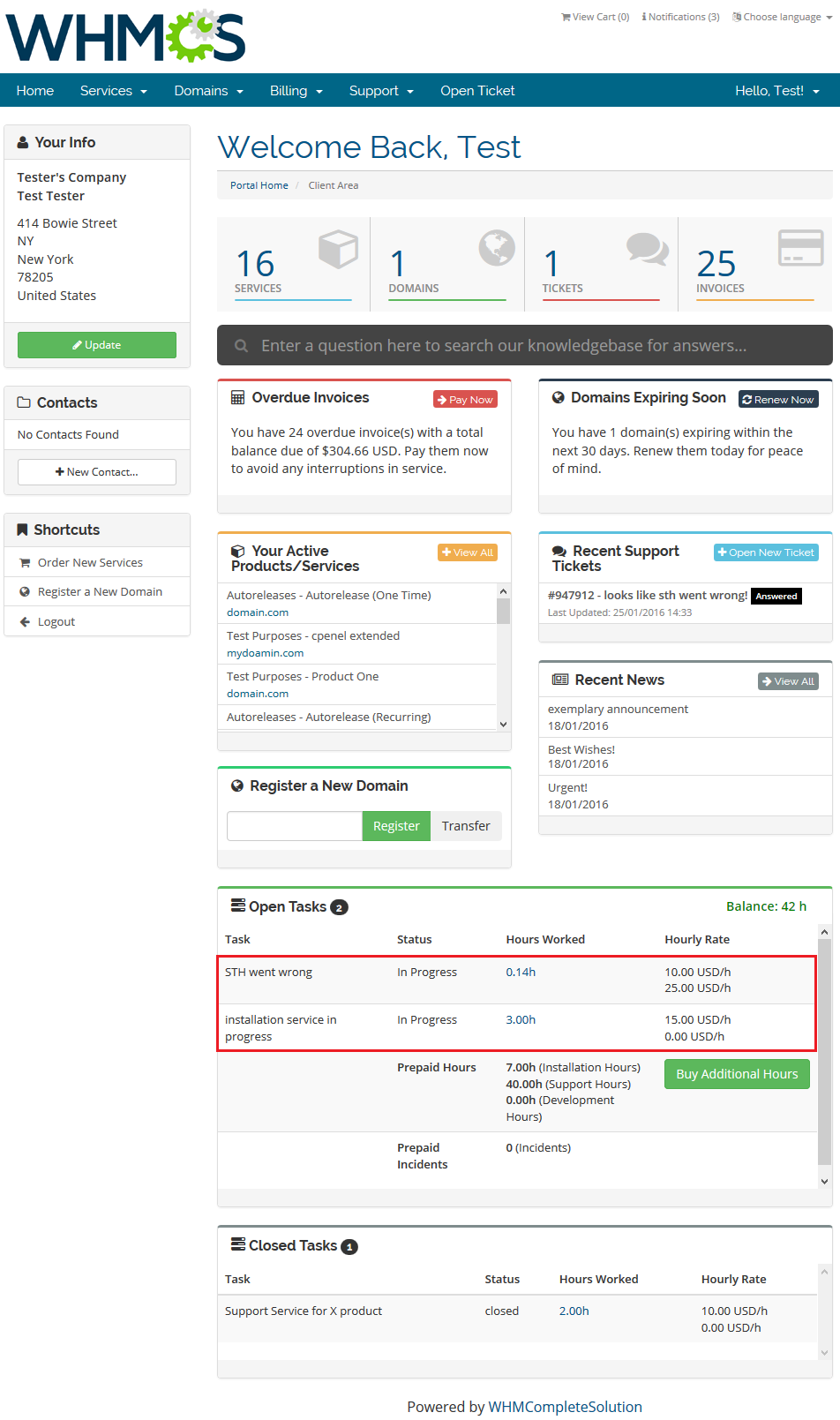
|
| Underneath, there is also a list of all closed tasks with the same details on each one of them. |
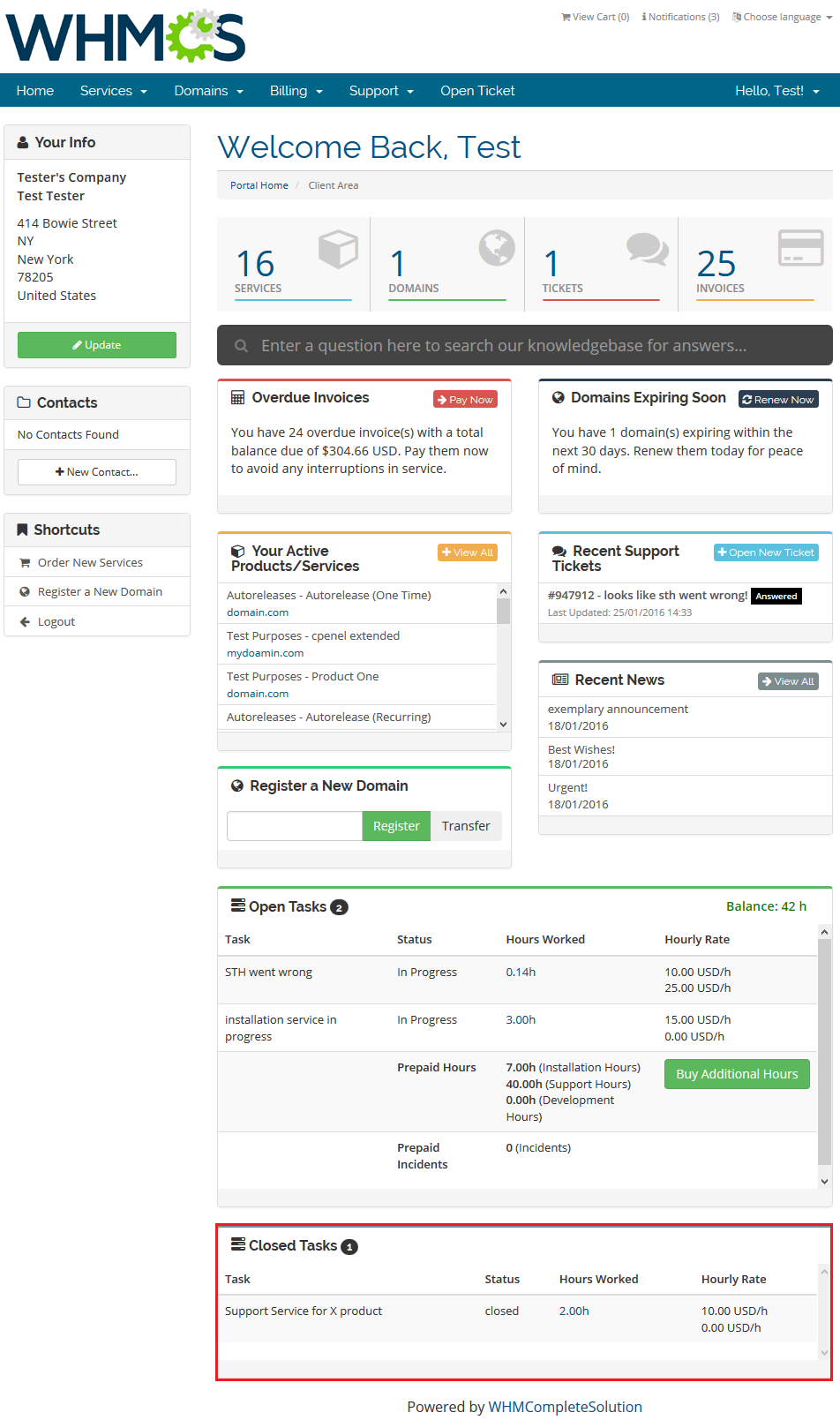
|
| As you can see, your client can order a provisioning module with additional hours by pressing 'Buy Additional Hours'. By default, it will move your clients to the order form of the provisioning module selected in the Time & Task Manager For WHMCS addon. |
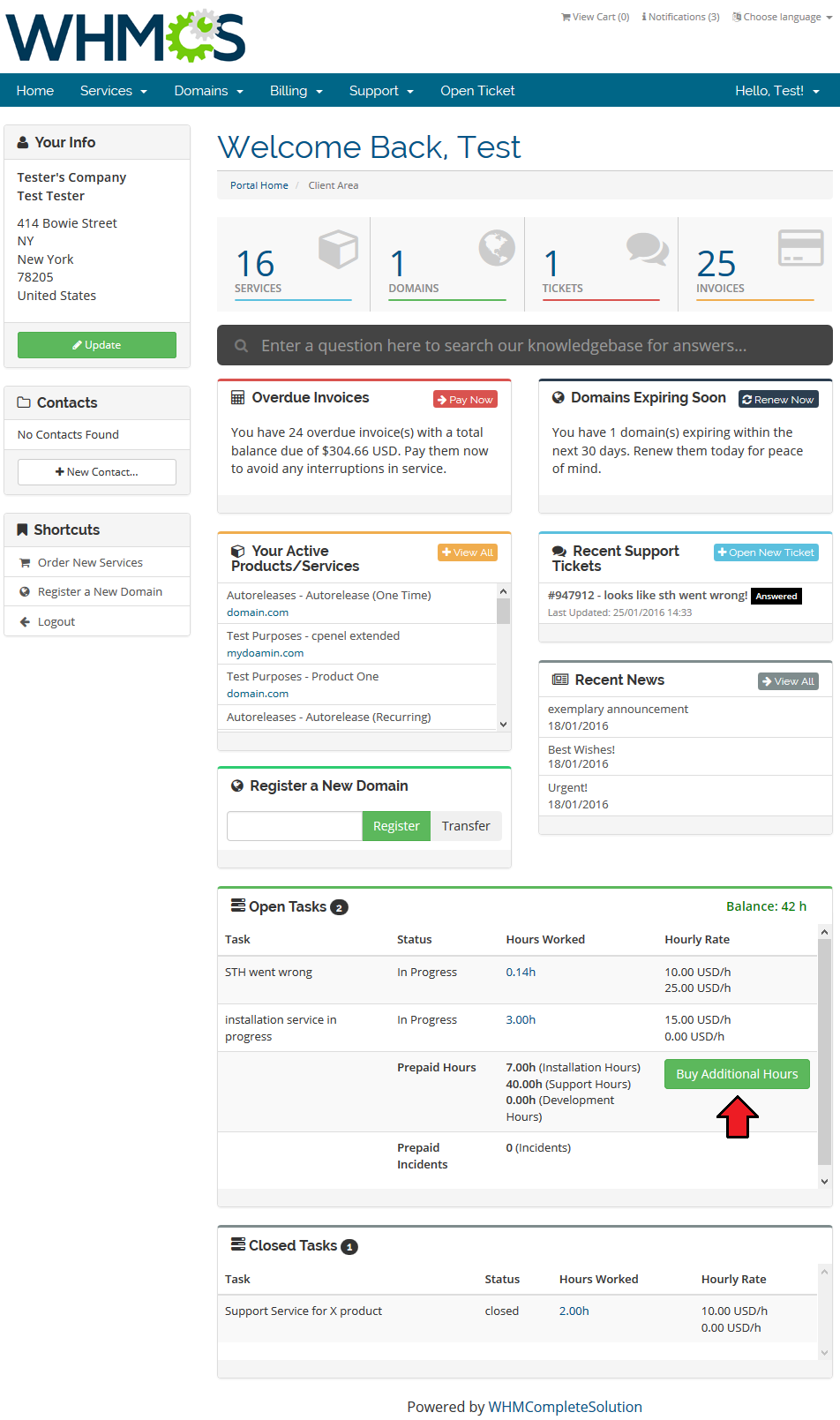
|
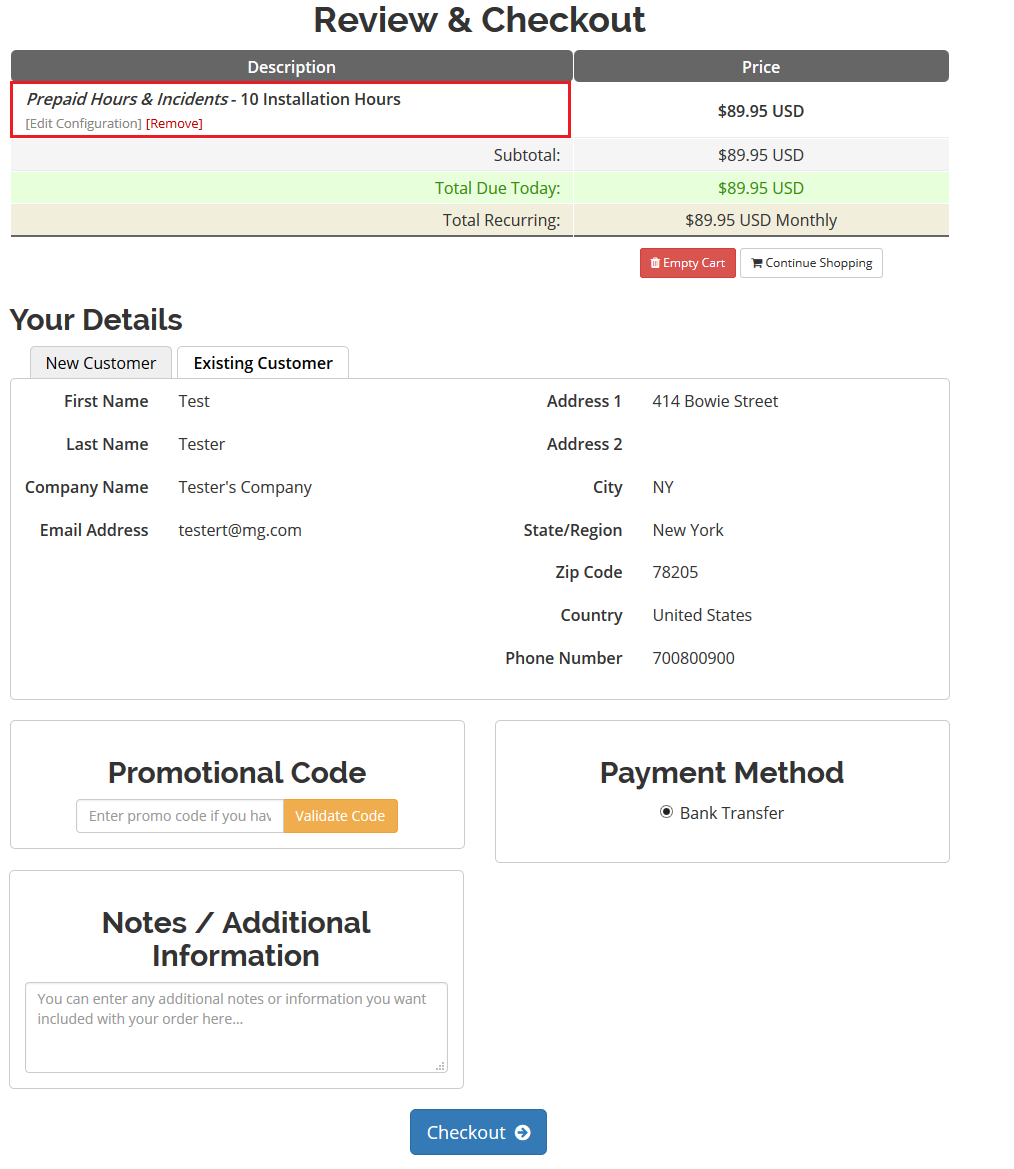
|
Sample Workflow
| Let's take a look at a sample workflow, starting from setting up prepaid hours through ordering a task to invoice generation. If any part of this workflow seems unclear to you, please make sure you have read carefully the rest of this documentation. |
| 1. Configure client custom field 'Development Hours' with 'Admin Only' checkbox marked. |
| 2. Proceed to the Time & Task Manager For WHMCS addon configuration and set up 40 USD/h for 'Development Hours'. |
| 3. Prepare Time & Task Manager For WHMCS provisioning product set up with recurring payment type and name it '10 Development Hours'. Fill in 10 into 'Development Hours' field in 'Module Settings'. |
| 4. Your client Tim Black ordered '10 Development Hours' product from your client area. As soon as the product was activated, he received 10 prepaid development hours. |
| 5. Afterward, he requested development work on his website. You went to 'Addons' → 'Time & Task Manager' → 'Tasks' and created a new task for this client concerning his request. |
| 6. You spent on this task 2 hours on the 16th of July and instructed your staff member John Smith to take it over. Of course, you have added time entry at the 'Work Sheet' tab reporting to your client that you have spent 2 hours on the 16th of July. |
7. In the next days, John Smith reported three time entries:
|
| 8. John finished 'Development Work' task on 21th, July. You had set up 'Operator Privileges' for John Smith, therefore he could not close the task by himself. |
| 9. Now, you have decided to bill your client for the task. To do so, you have gone to 'Billing' tab and chosen 'Tim Black' from the support client filter. |
| 10. Marked time entries were summarized, 18 and a half were spent on Tim Black's task. The task is using 'Development Hours' prepaid hours and Tim has 10 prepaid hours of this type. |
11. The invoice is generated with 4 items, one per each time entry.
Invoice on 340$ will be generated for Tim Black. |
| This is only a sample and simple workflow of our module. Therefore, it shows only a small part of Time & Task Manager For WHMCS possibilities. |
Tips
| 1. Prepaid hours can be afterwards used to pay for tasks using the same prepaid hour type. |
| 2. If you are manually generating an invoice from at least two time entries bound to the same client, one summary invoice for that client will be created. |
| 3. Cron generates one invoice per support client. Of course, the invoice will not be generated if no time entries exist for the invoiced client. |
| 4. In order to apply tax to such invoice, make sure you marked 'Billable Items' at your tax rule. |
| 5. As this module supports a template system, any changes made in the module's template files will be saved after the upgrade process. |
Update Instructions
| An essential guidance through the process of updating the module is offered here. Ensure successful completion of the module update by carefully following each step, thereby preventing data loss or any unforeseen issues. |
Upgrade Guide
| Seeking a solution that offers greater flexibility, customization tailored to your precise needs, and unrestricted availability? There is an option that not only proves to be cost-effective in the long run but also includes prioritized support services, making it a truly valuable investment. Opt for the Open Source version of your Time & Task Manager For WHMCS module to unlock these benefits. Follow a comprehensive guide covering the transition process, the advantages it brings, and step-by-step instructions on what to do next after the order has been successfully finalized. |
Common Problems
| 1. When you have problems with connection, check whether your SELinux or firewall does not block ports. |
| 2. Make sure you have pricing set up in every used in your system currency, otherwise problems may occur. |
| 3. If you have problems with updating the module to a newer version, please follow the standard Modules Update guide. |
| 4. If you encounter a situation where the number of the client's remaining prepaid hours is greater than the number of actually bought ones, use the recalculation script to reset them to the number of the actually bought hours. You can run it by executing the command below: php -q path_to_whmcs/modules/addons/TimeTaskManager/shell/recalculateScript.php Note that it will have no effect on the clients whose number of remaining prepaid hours is lower than the purchased hours. |